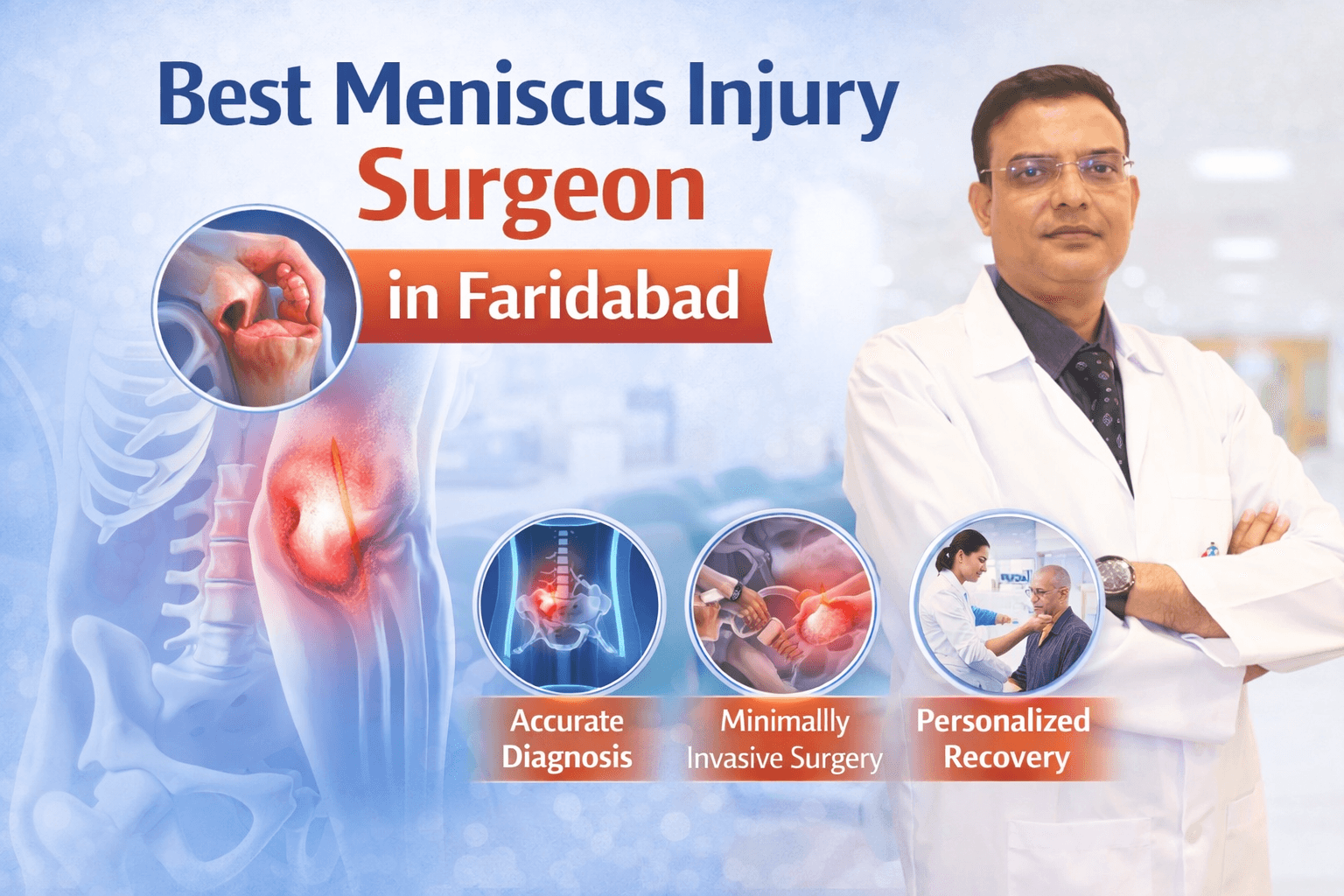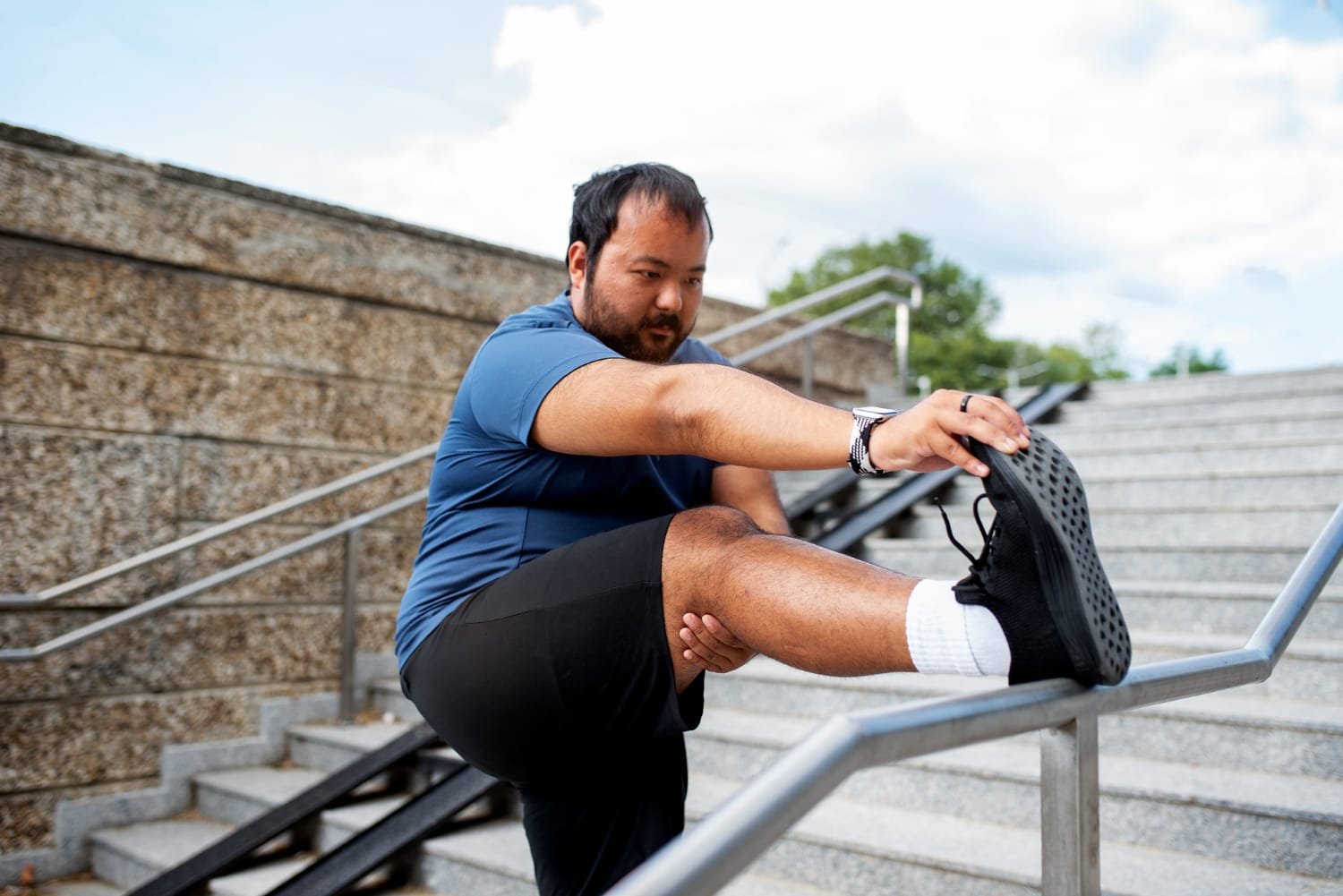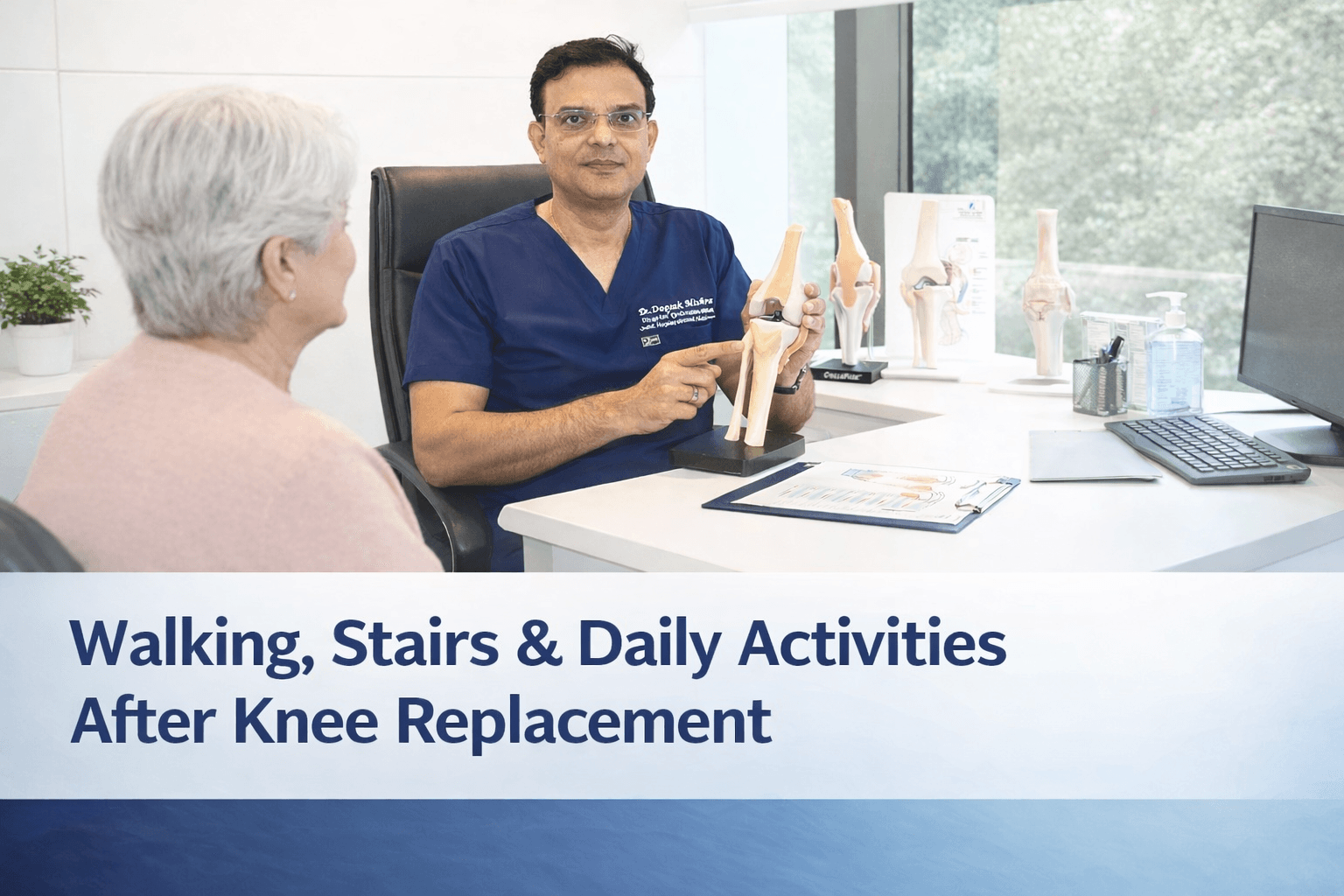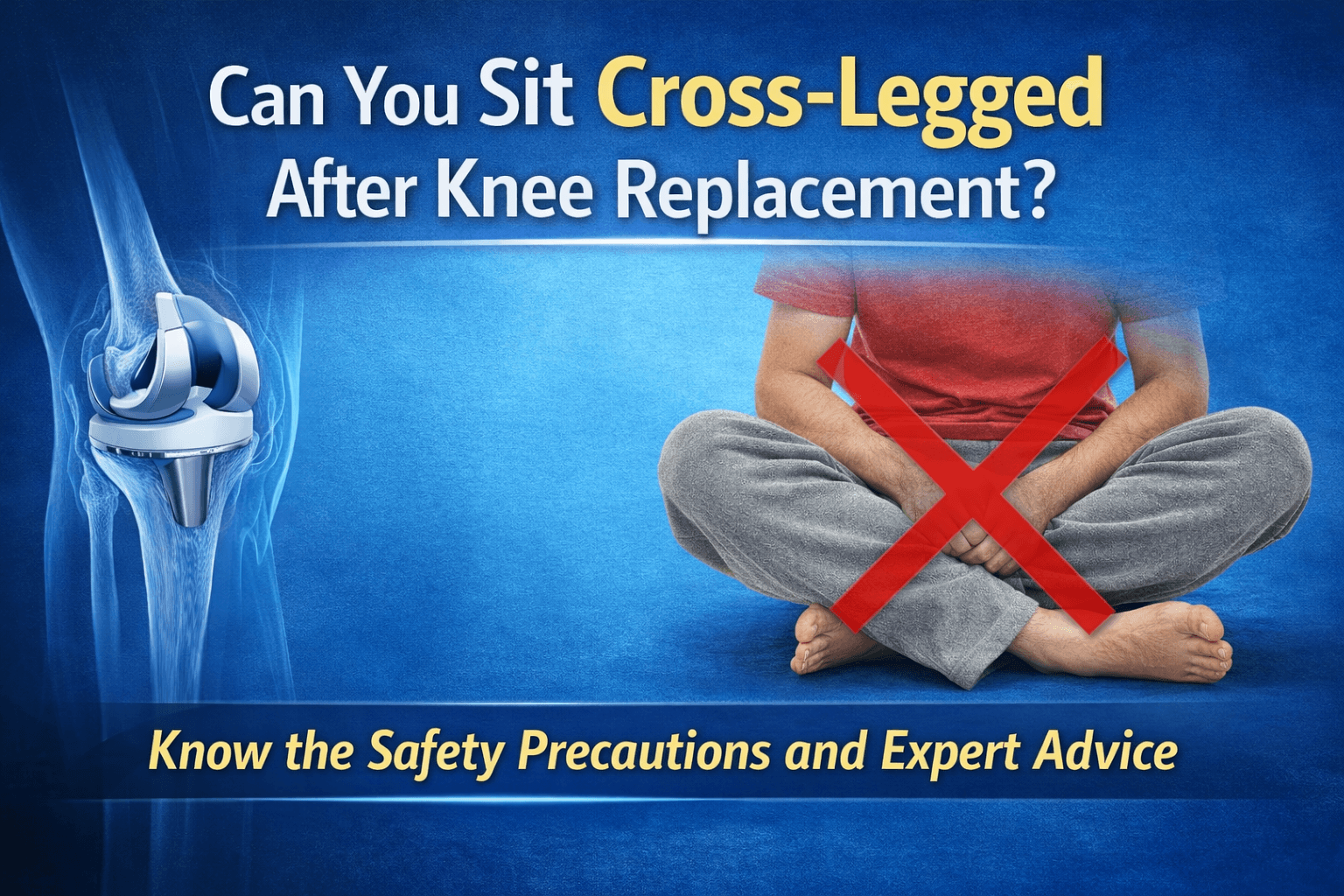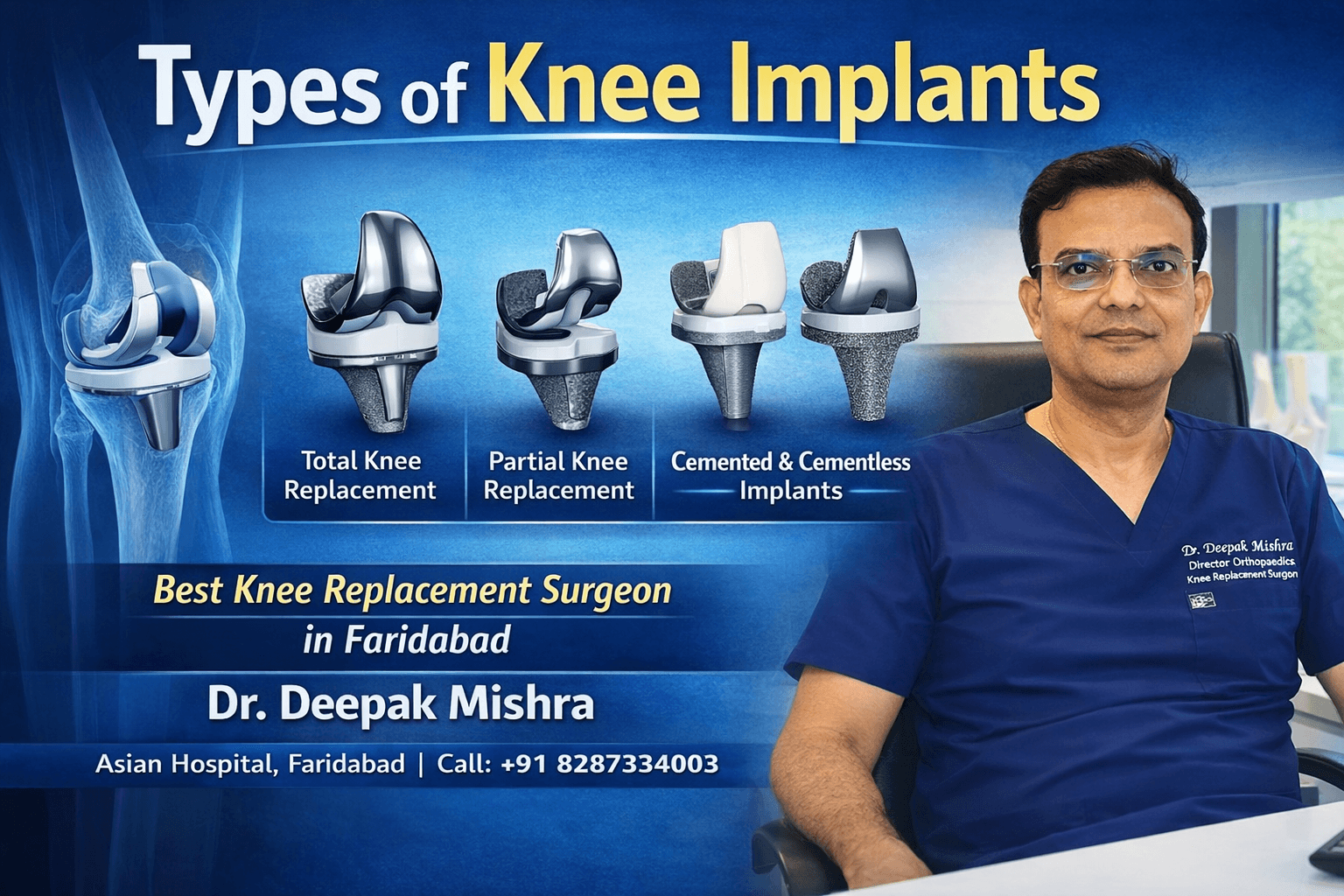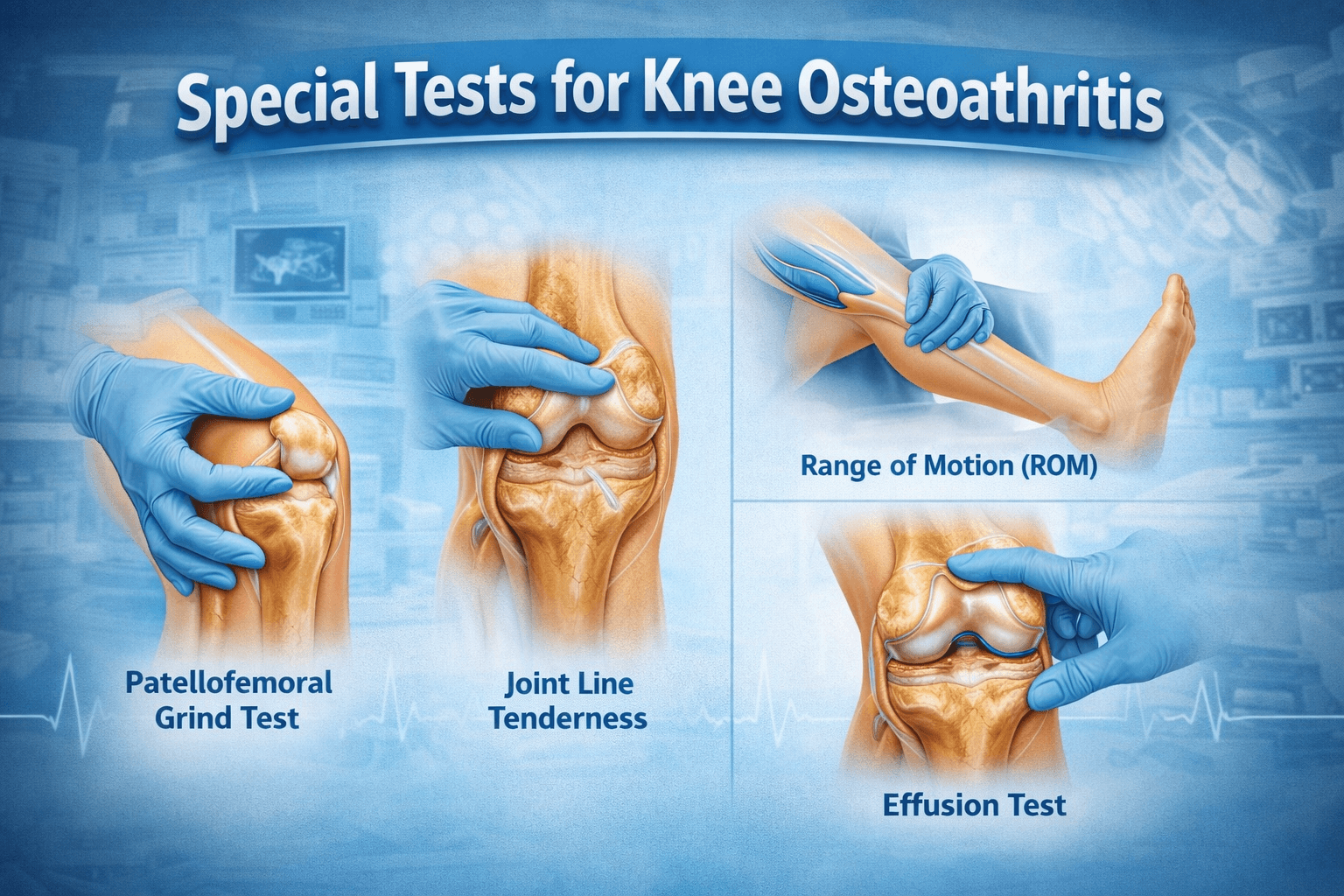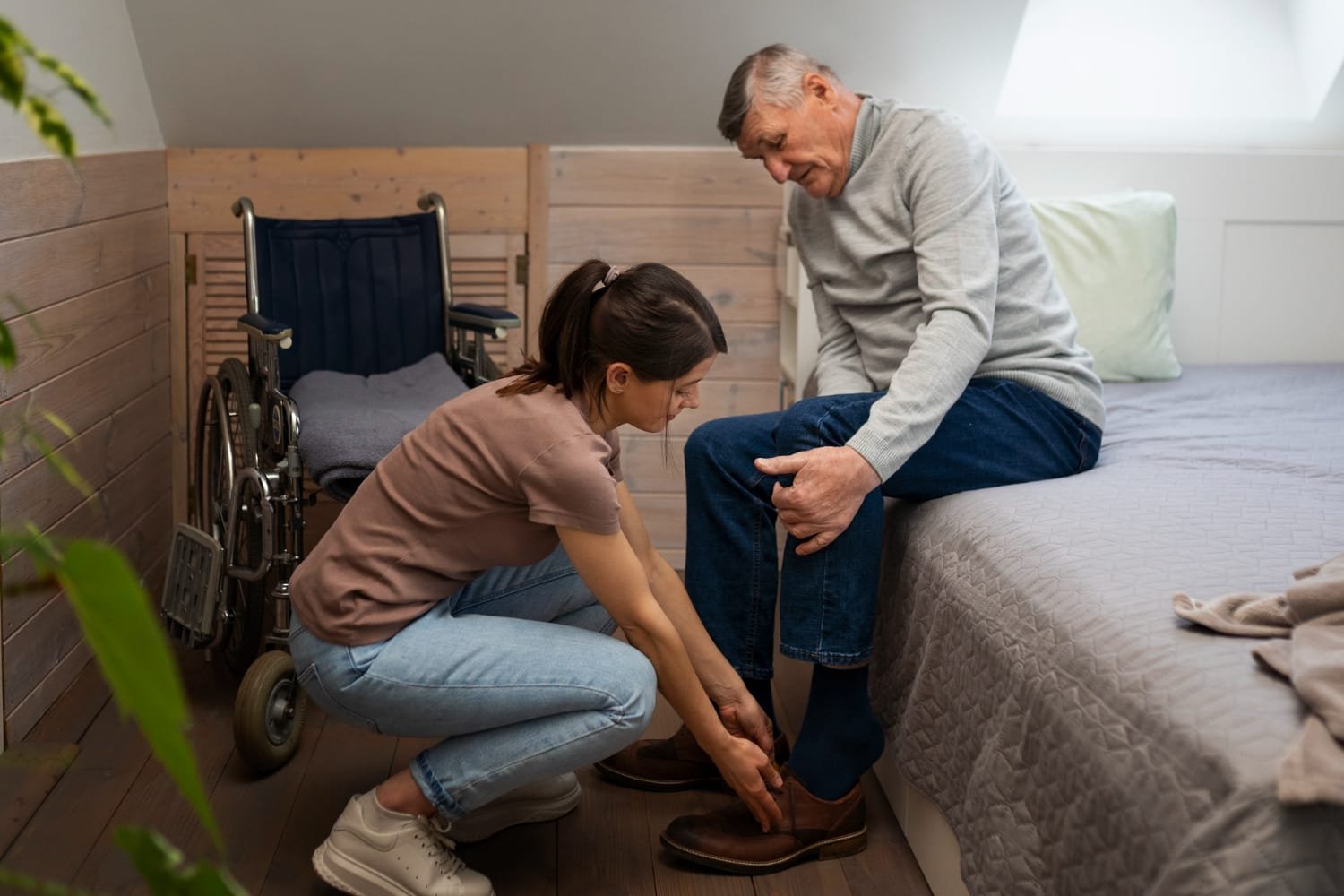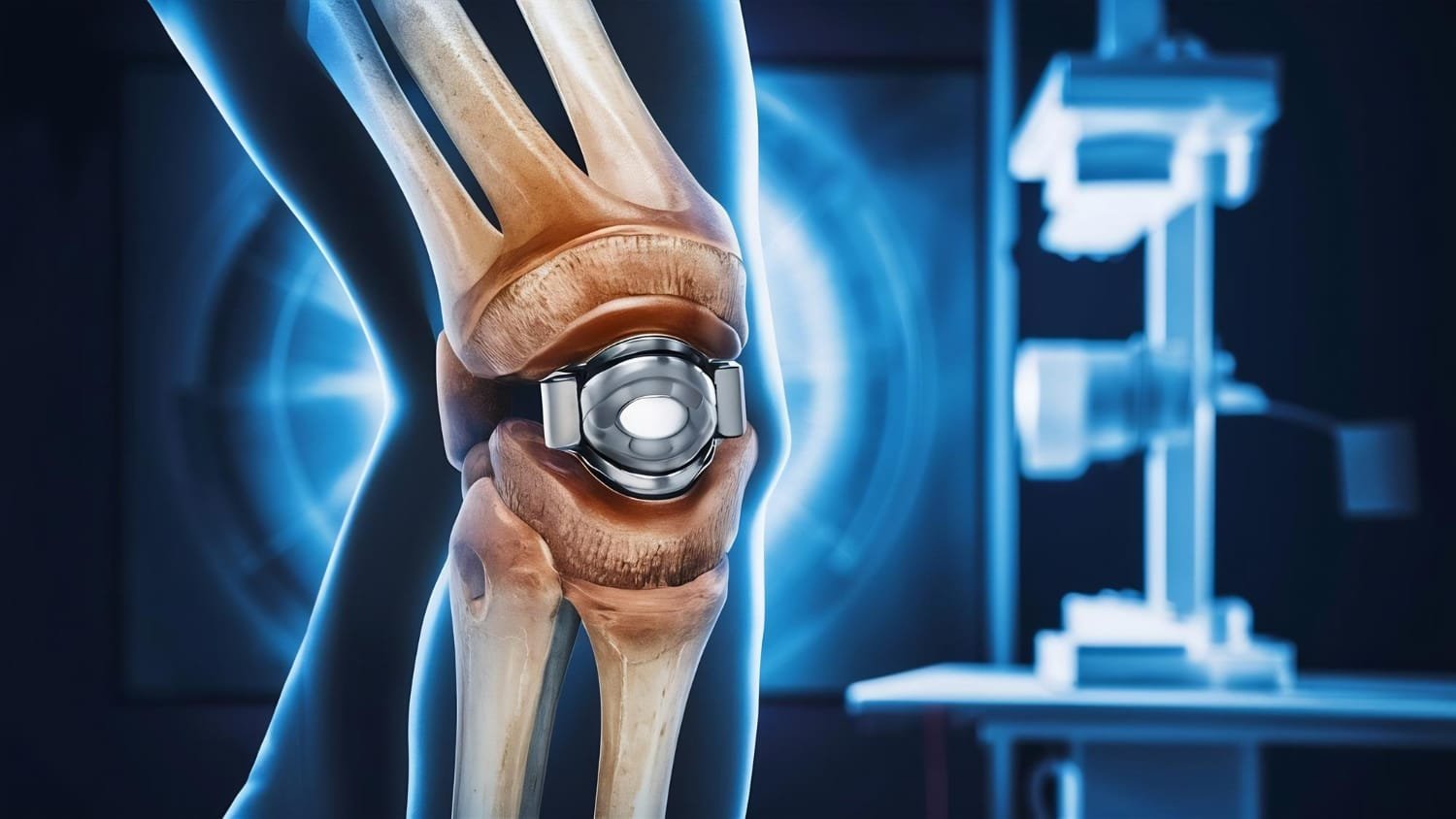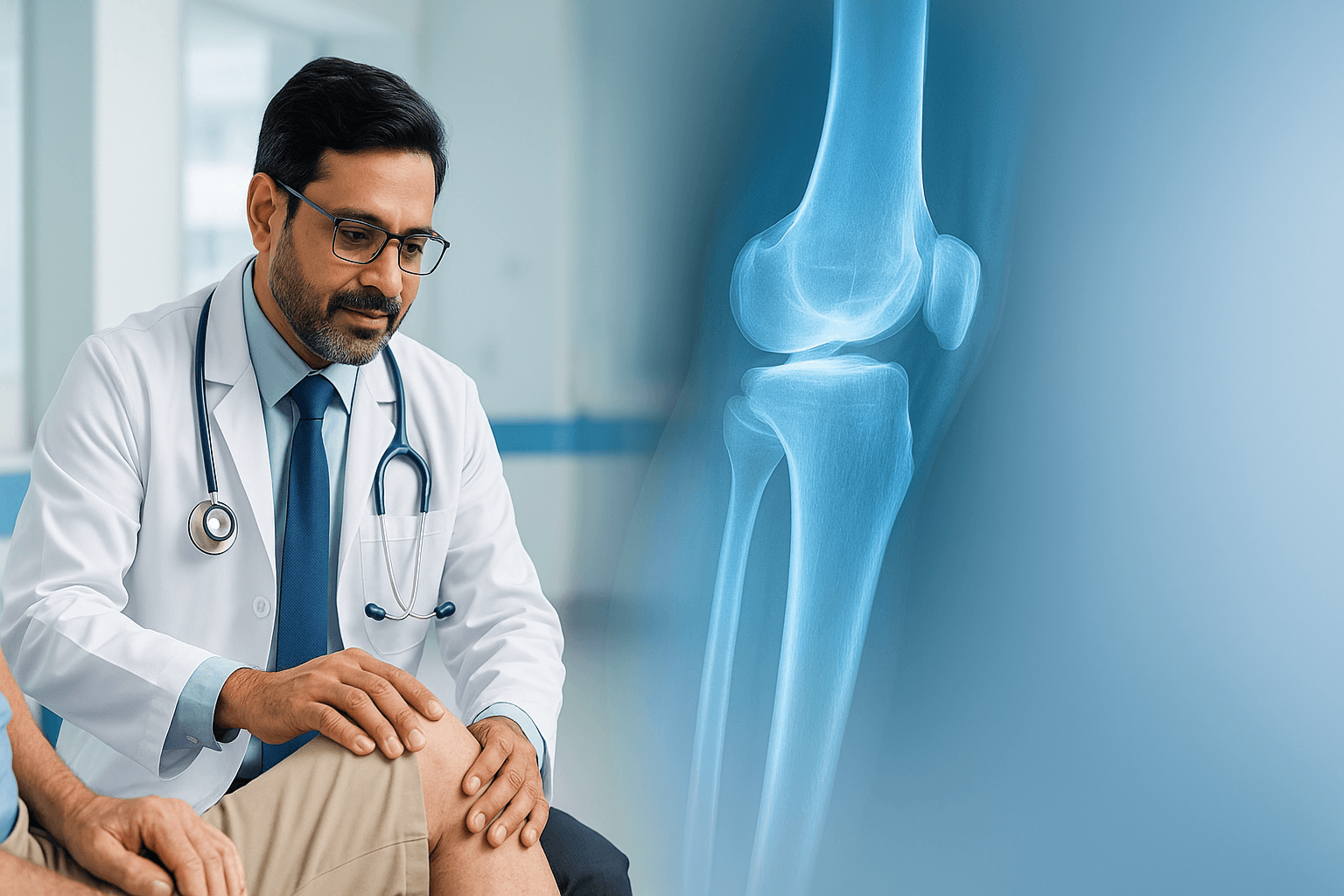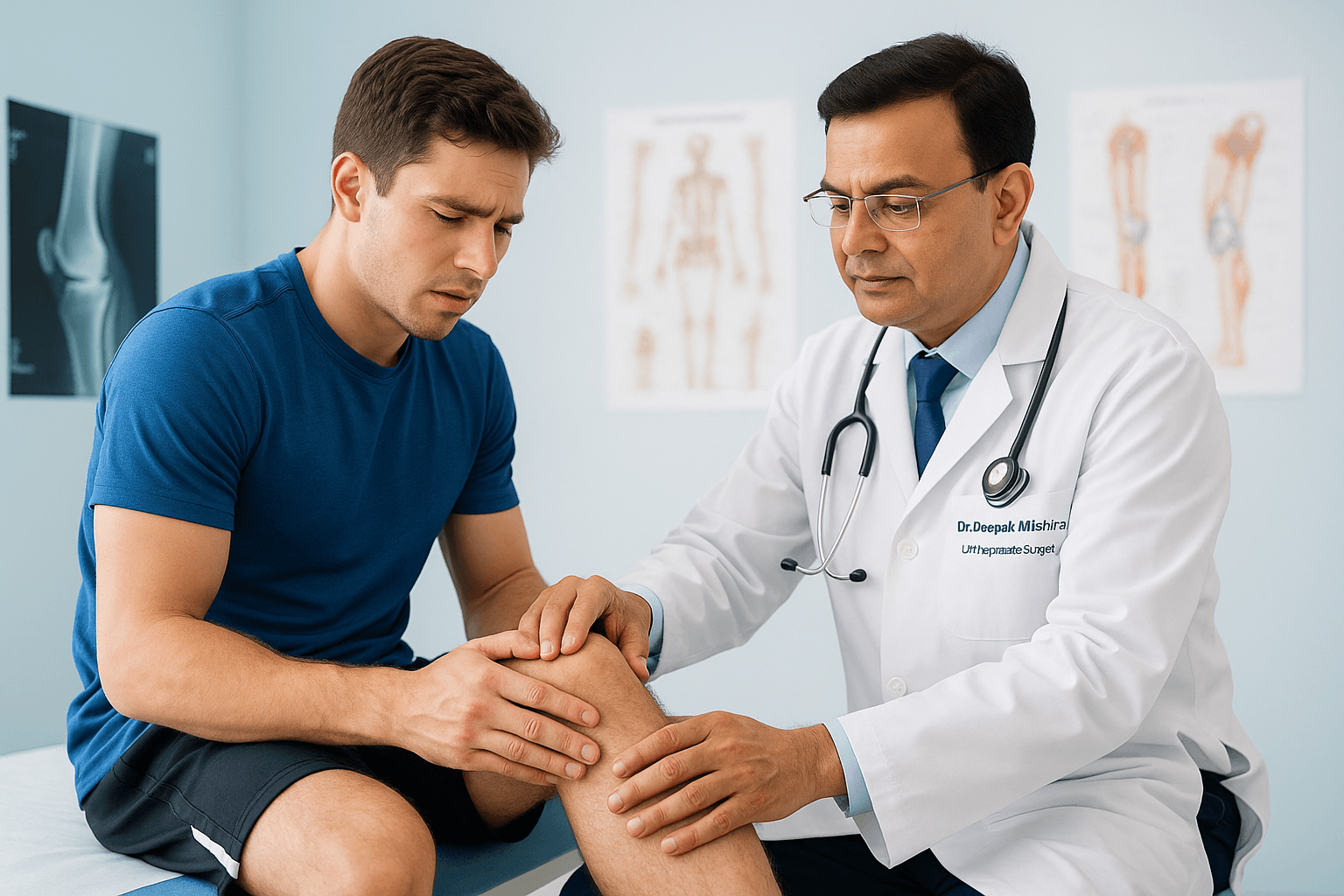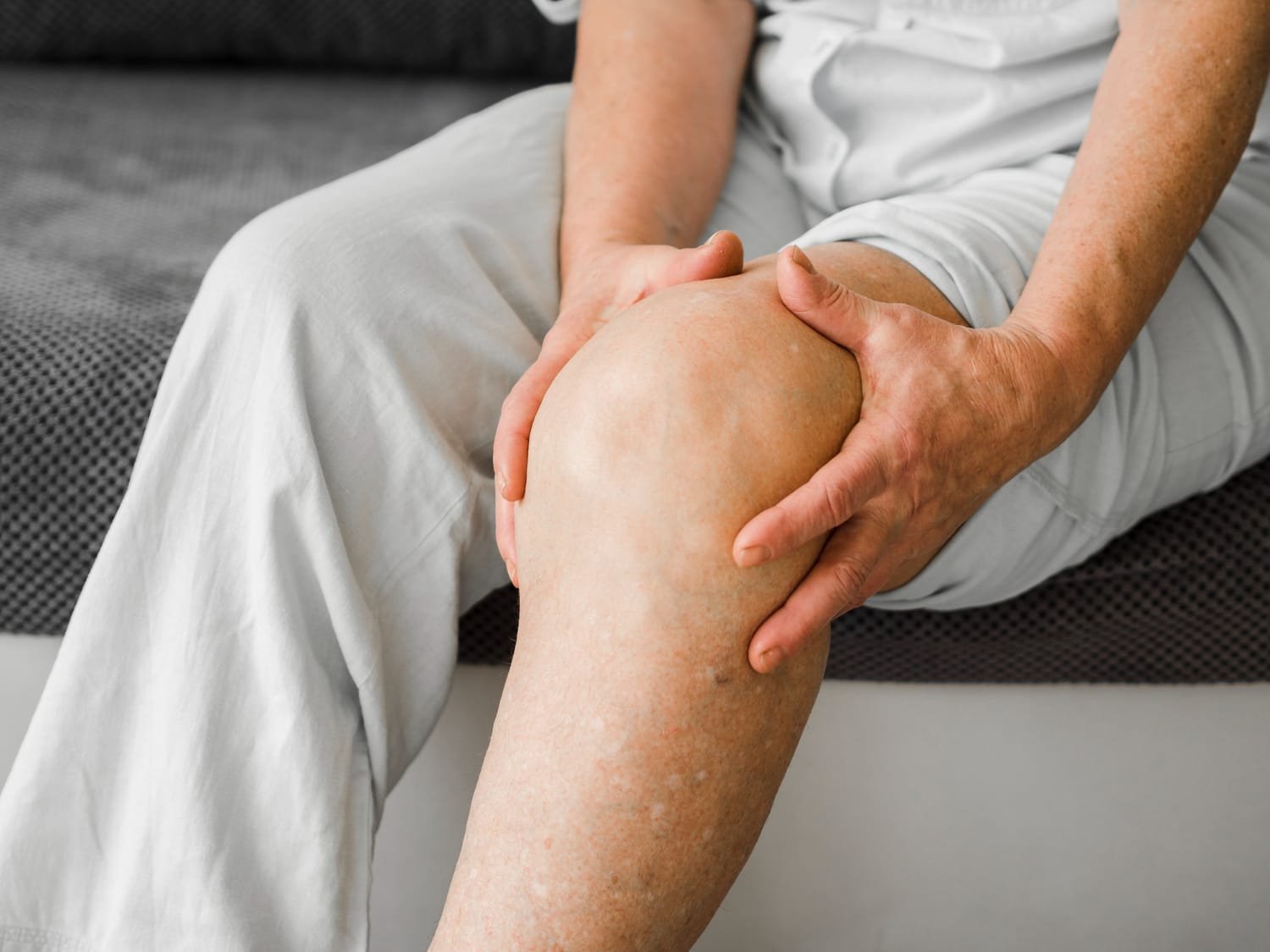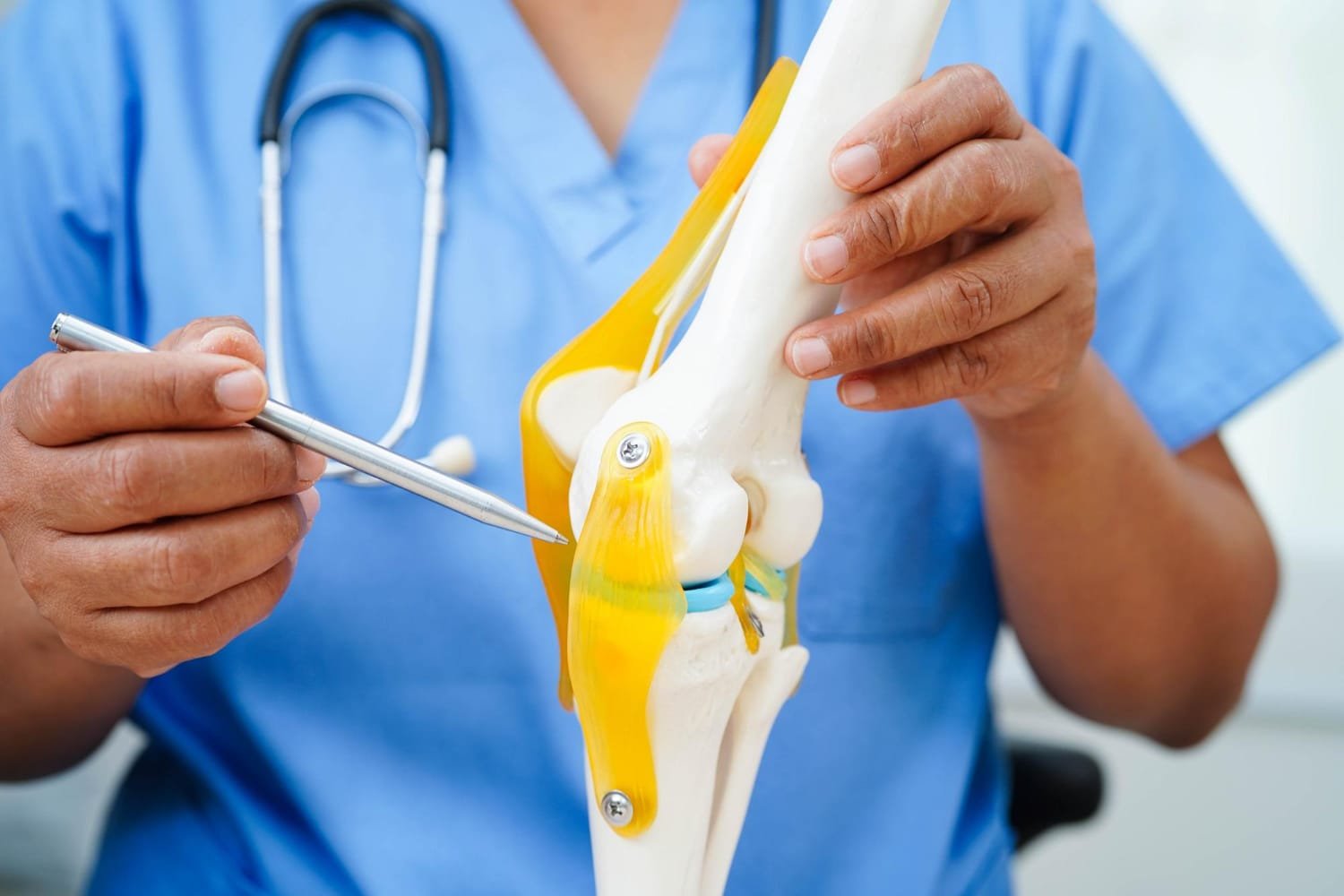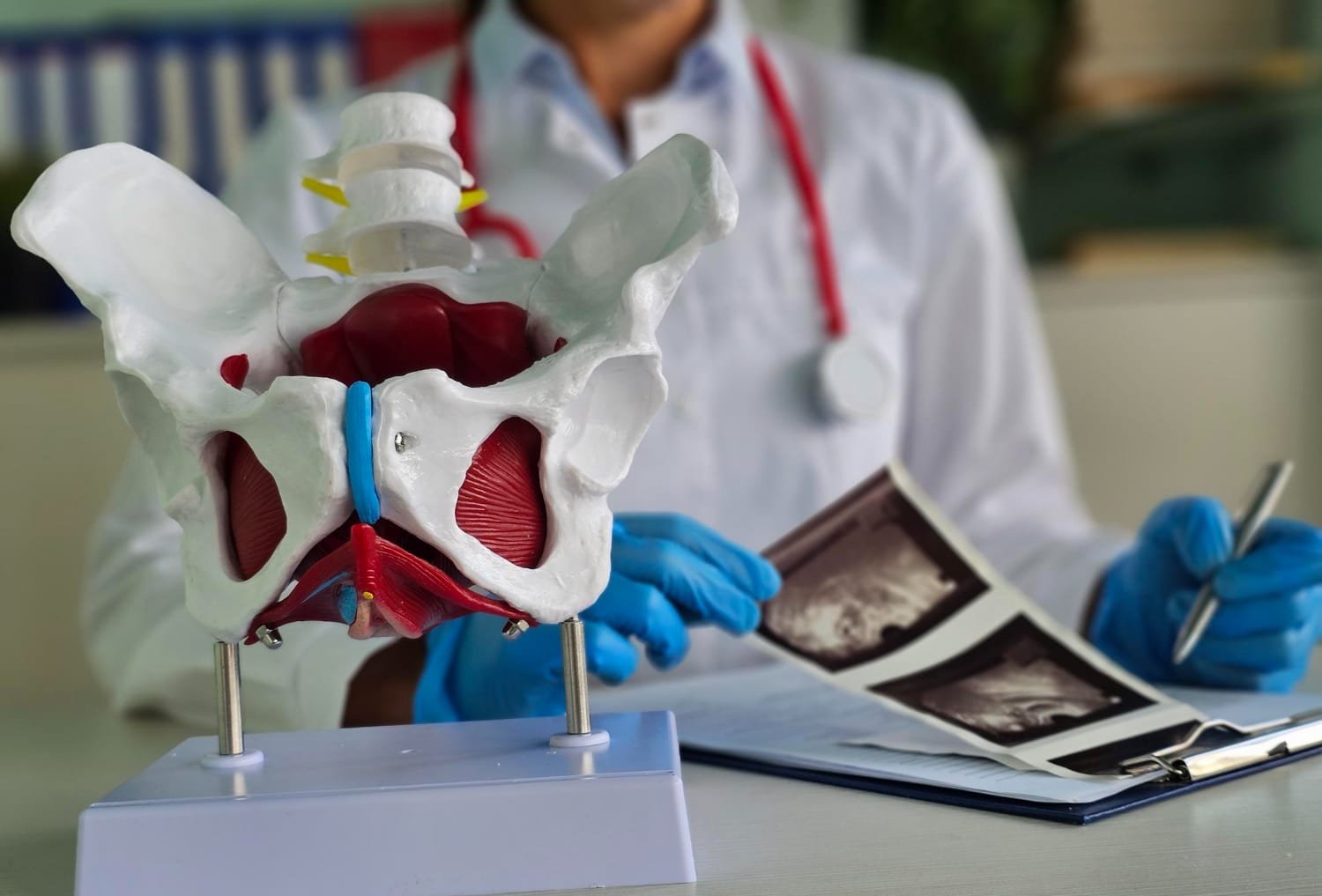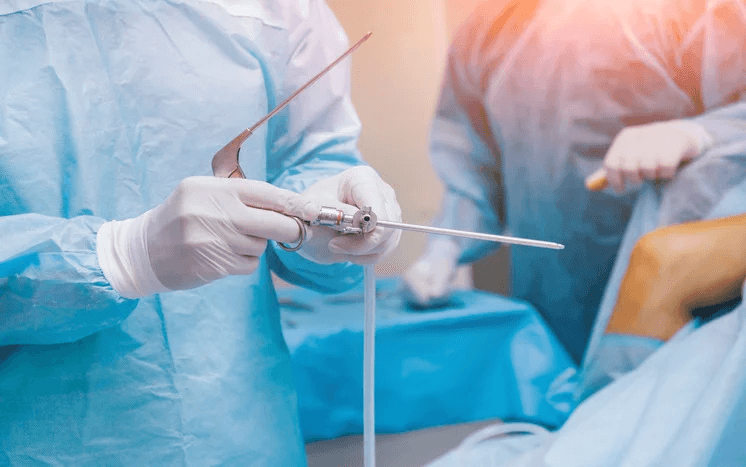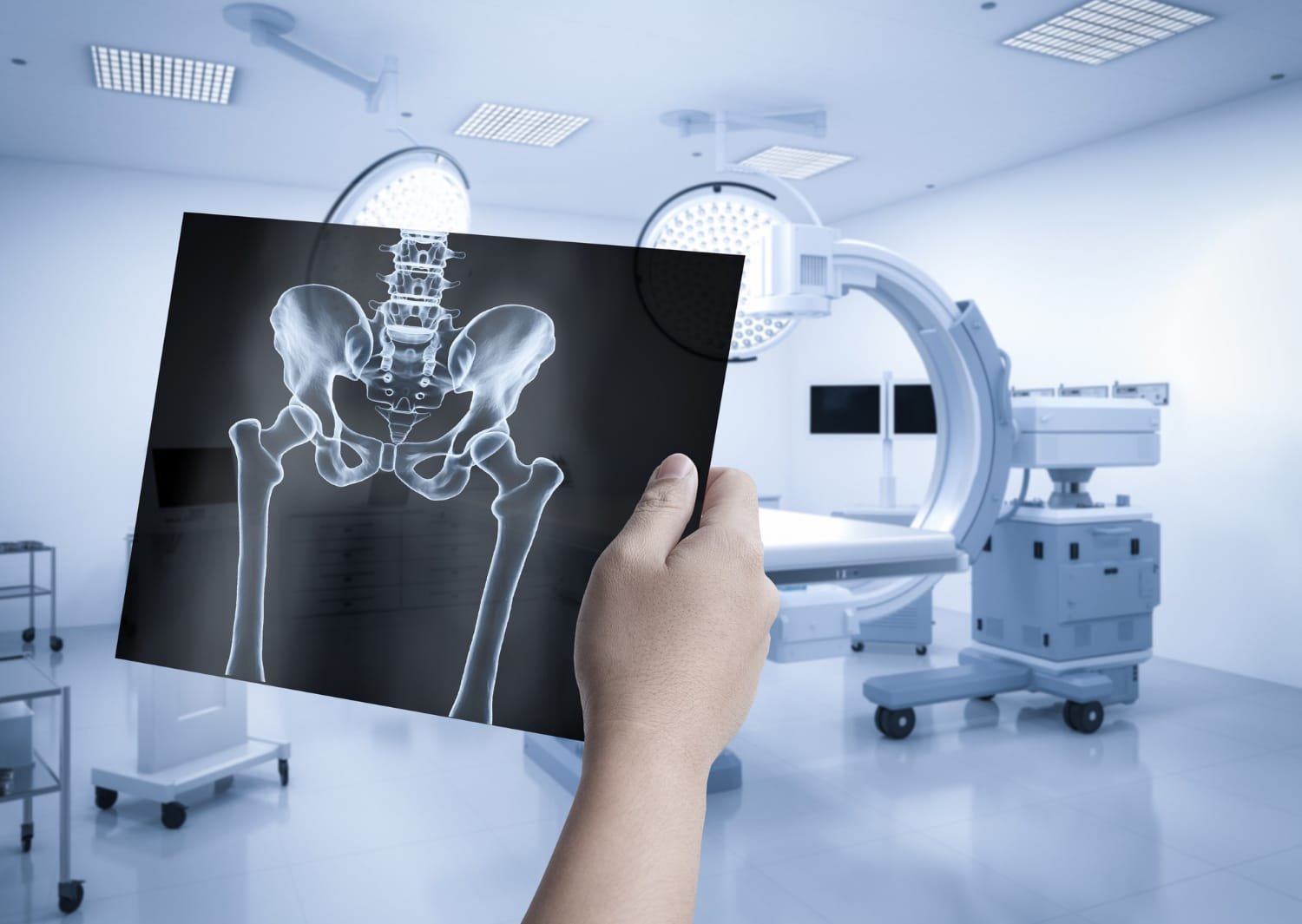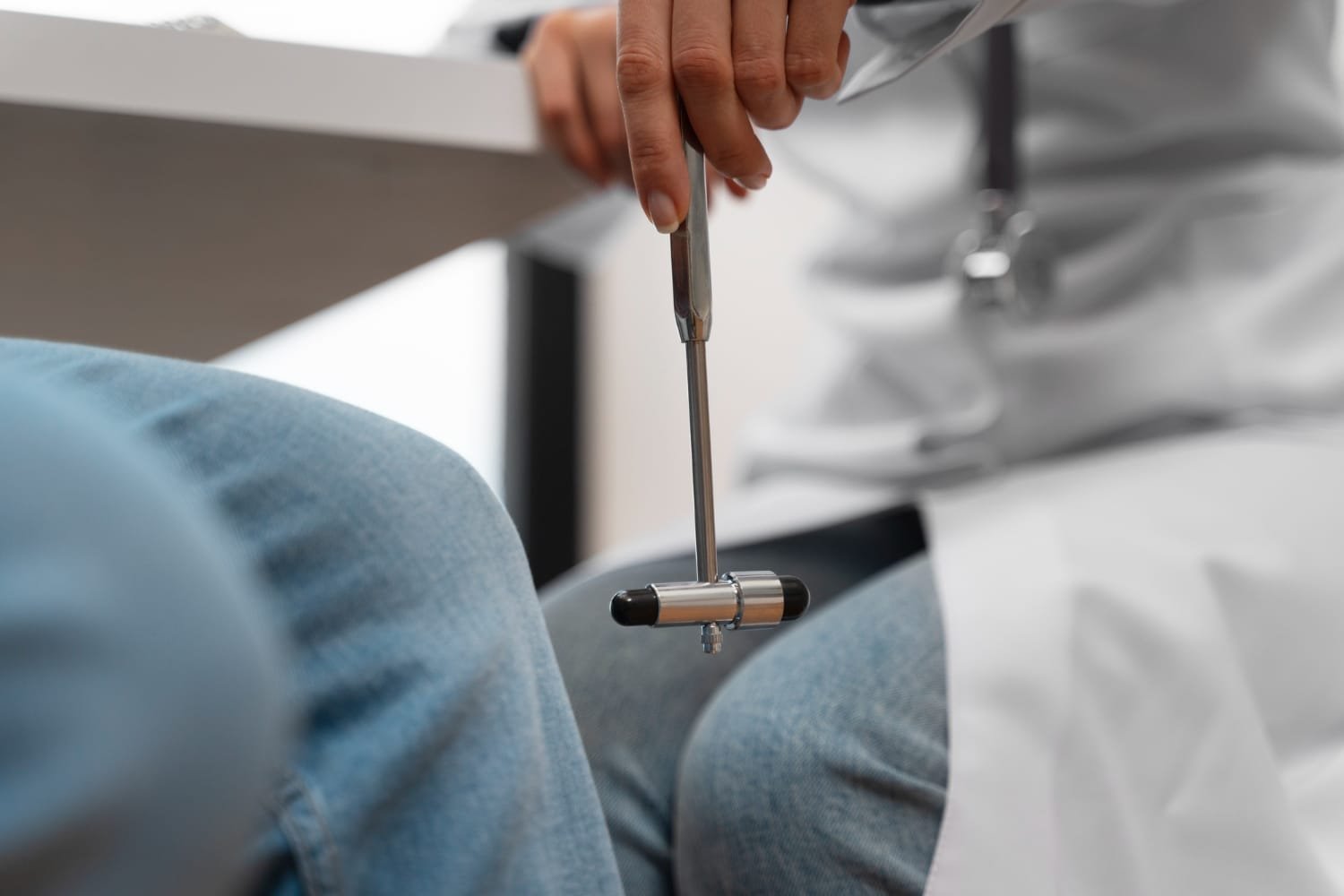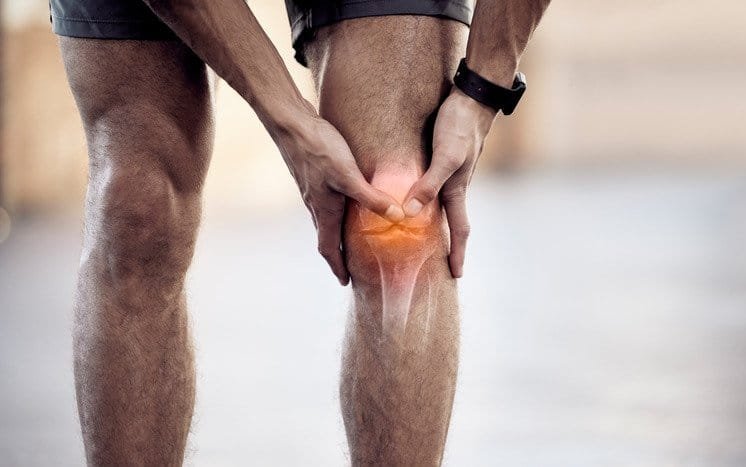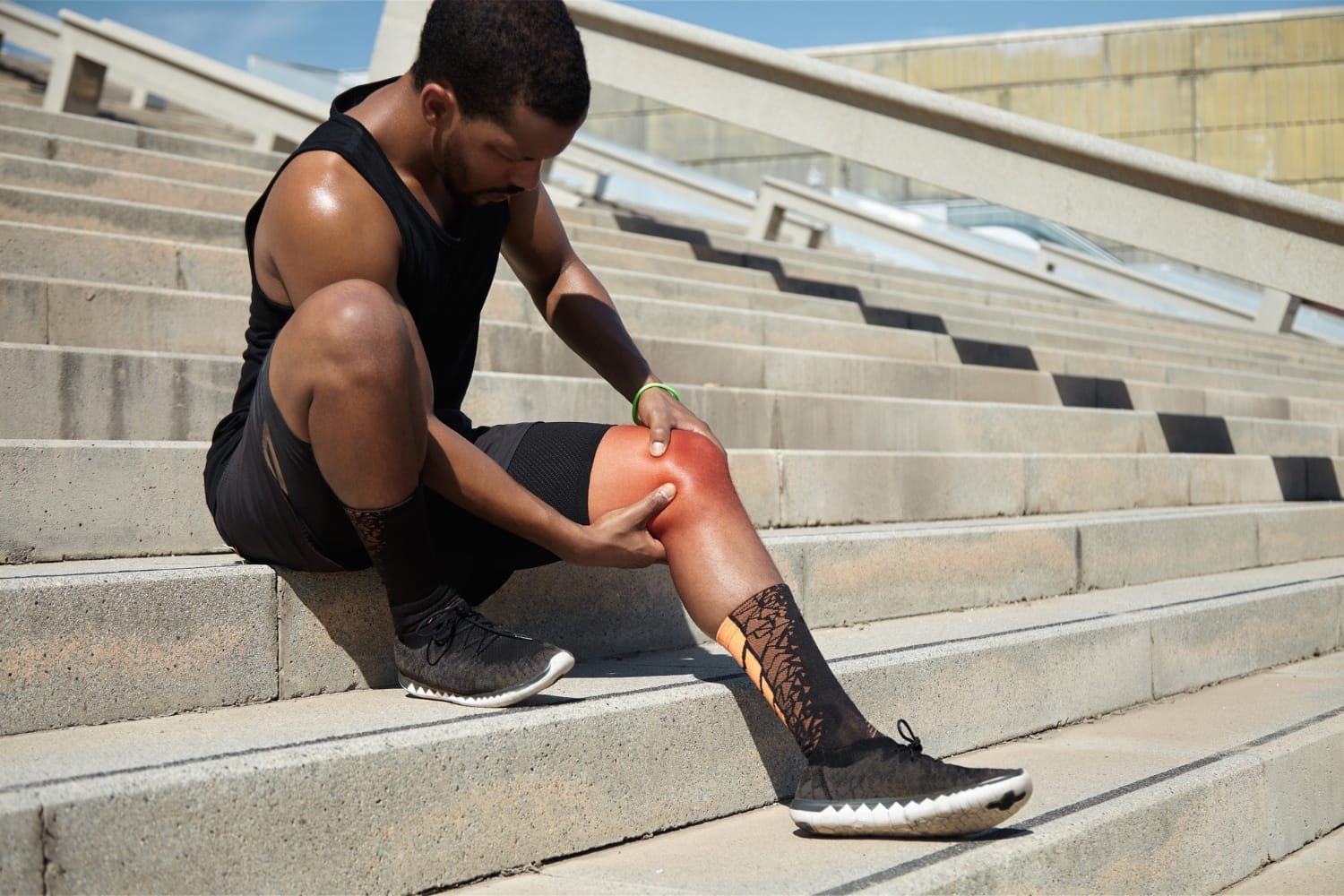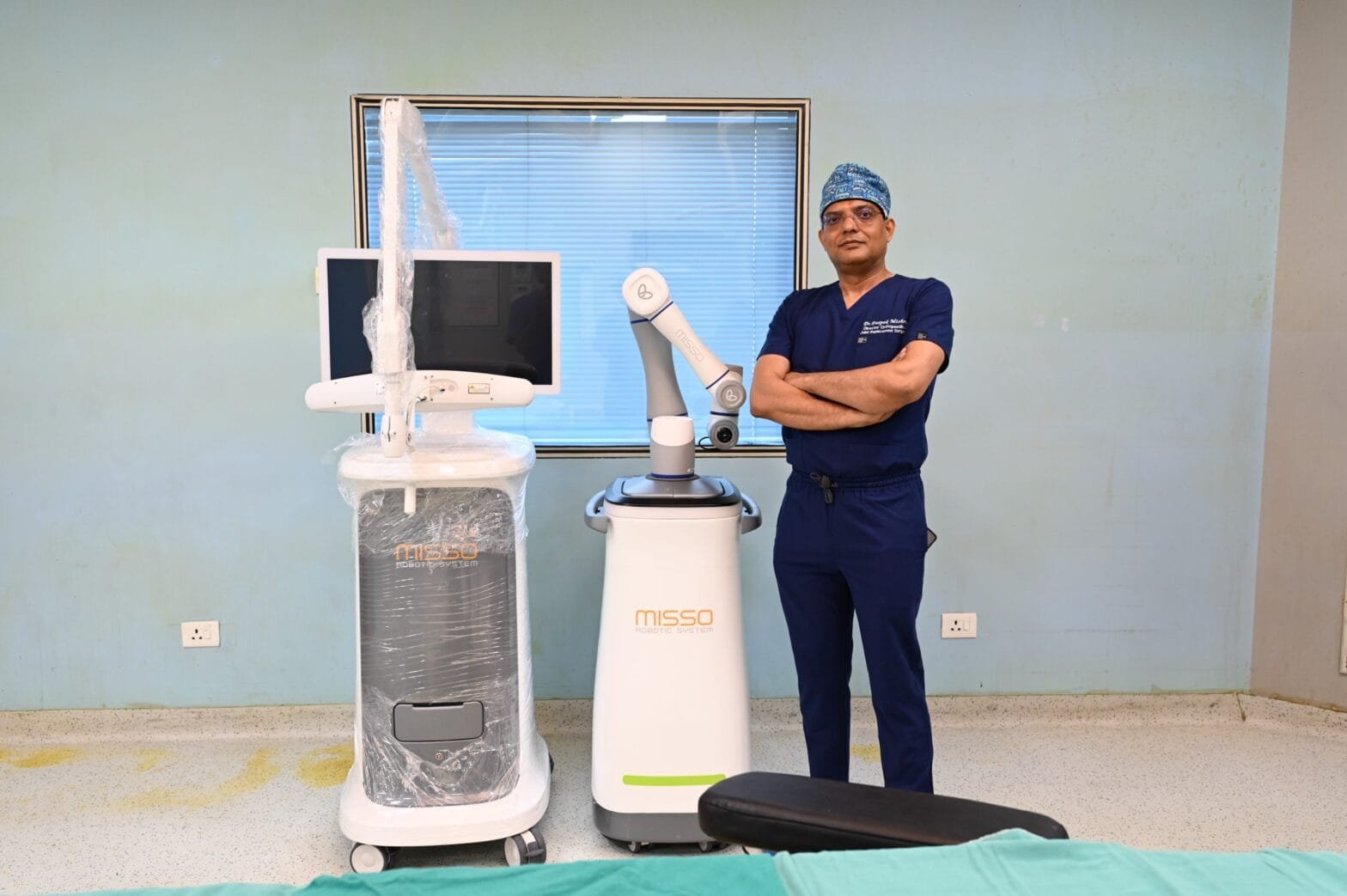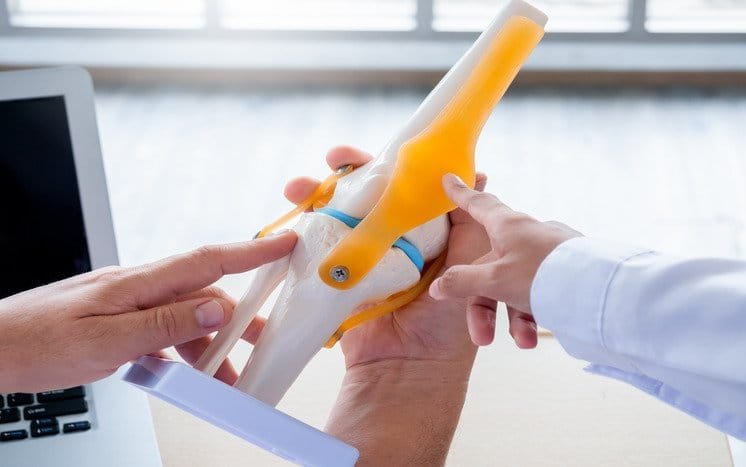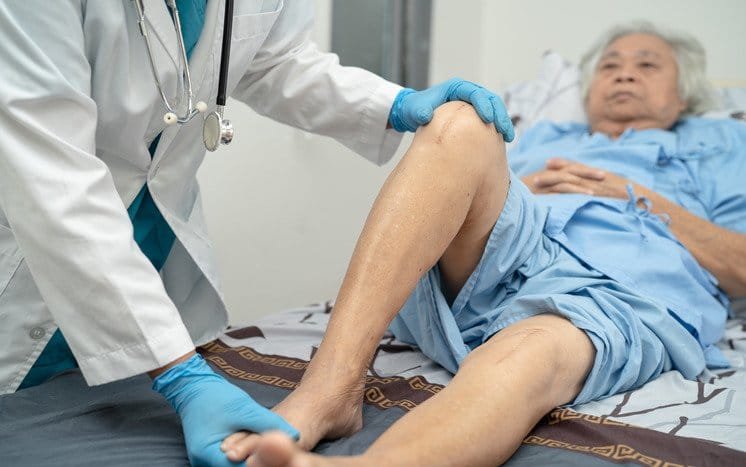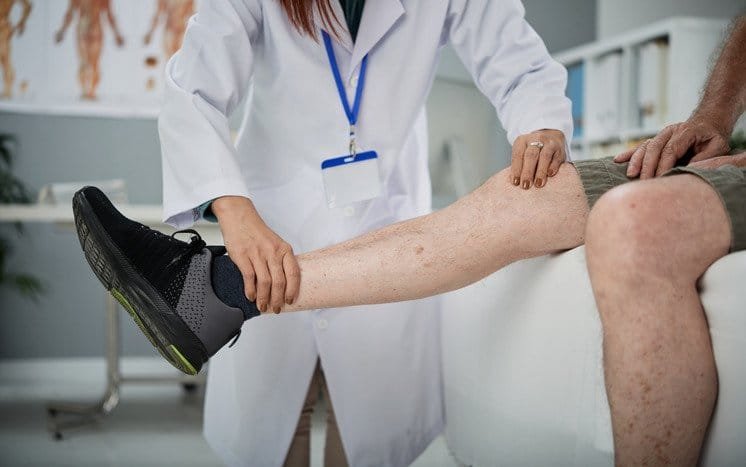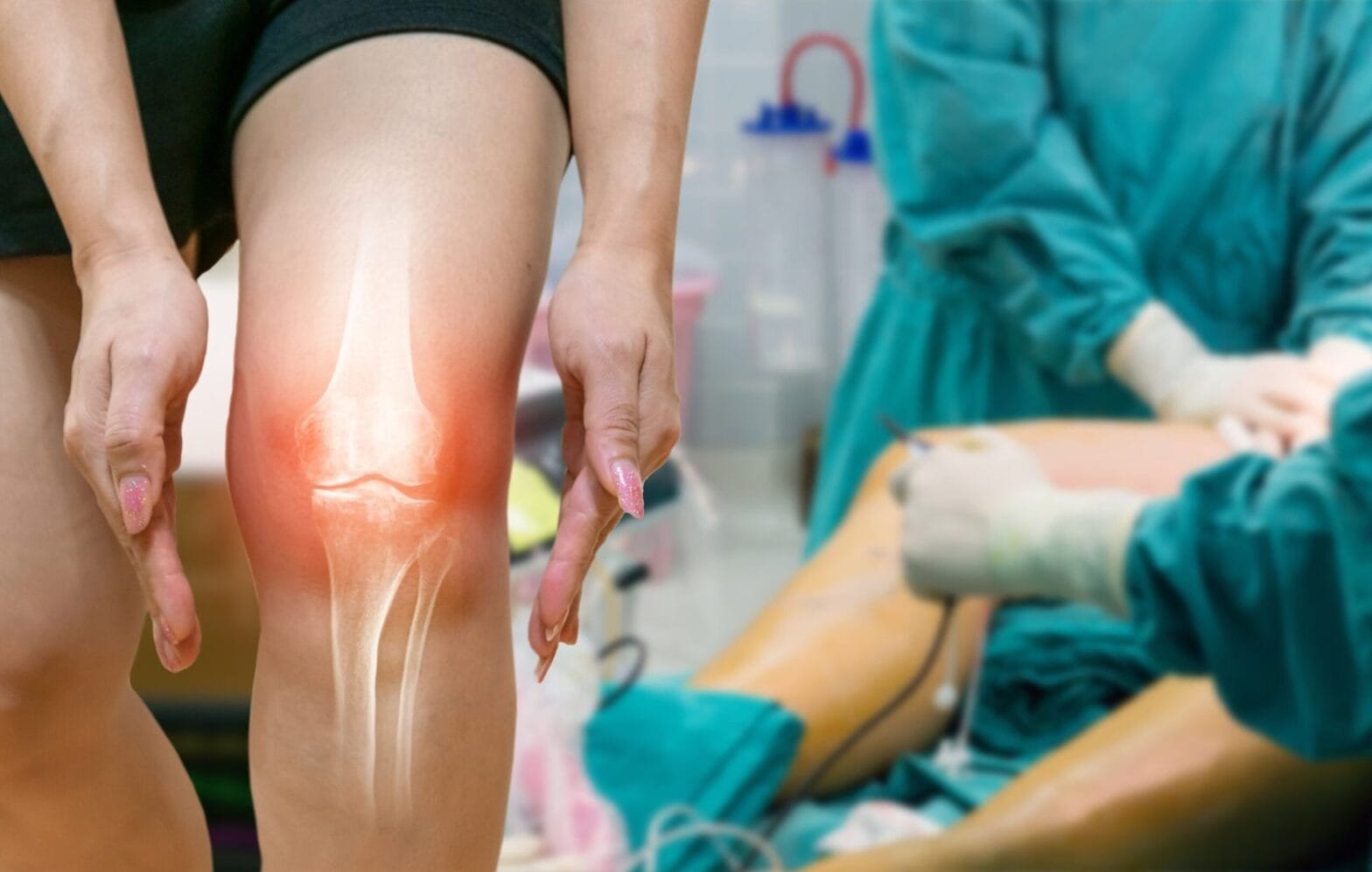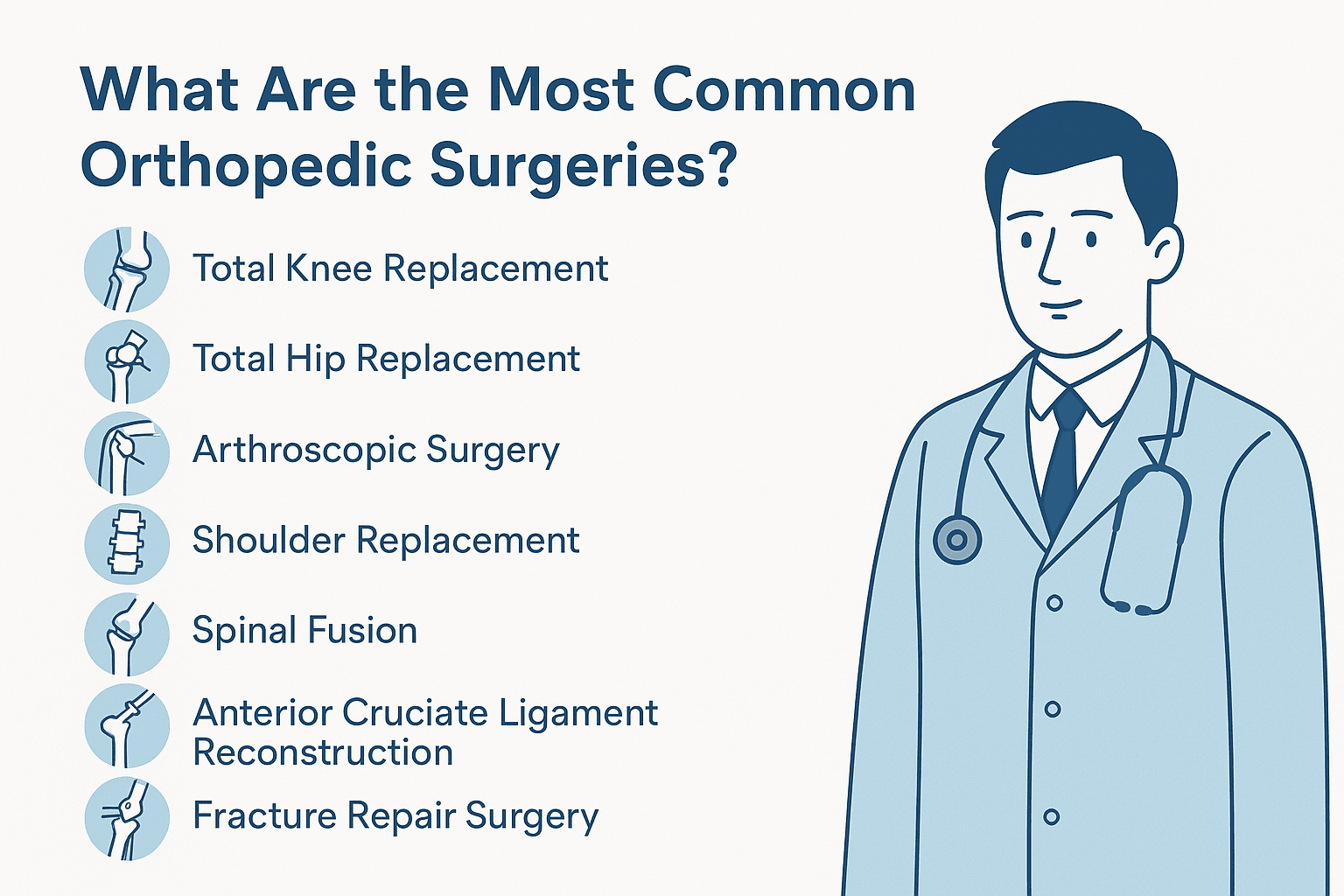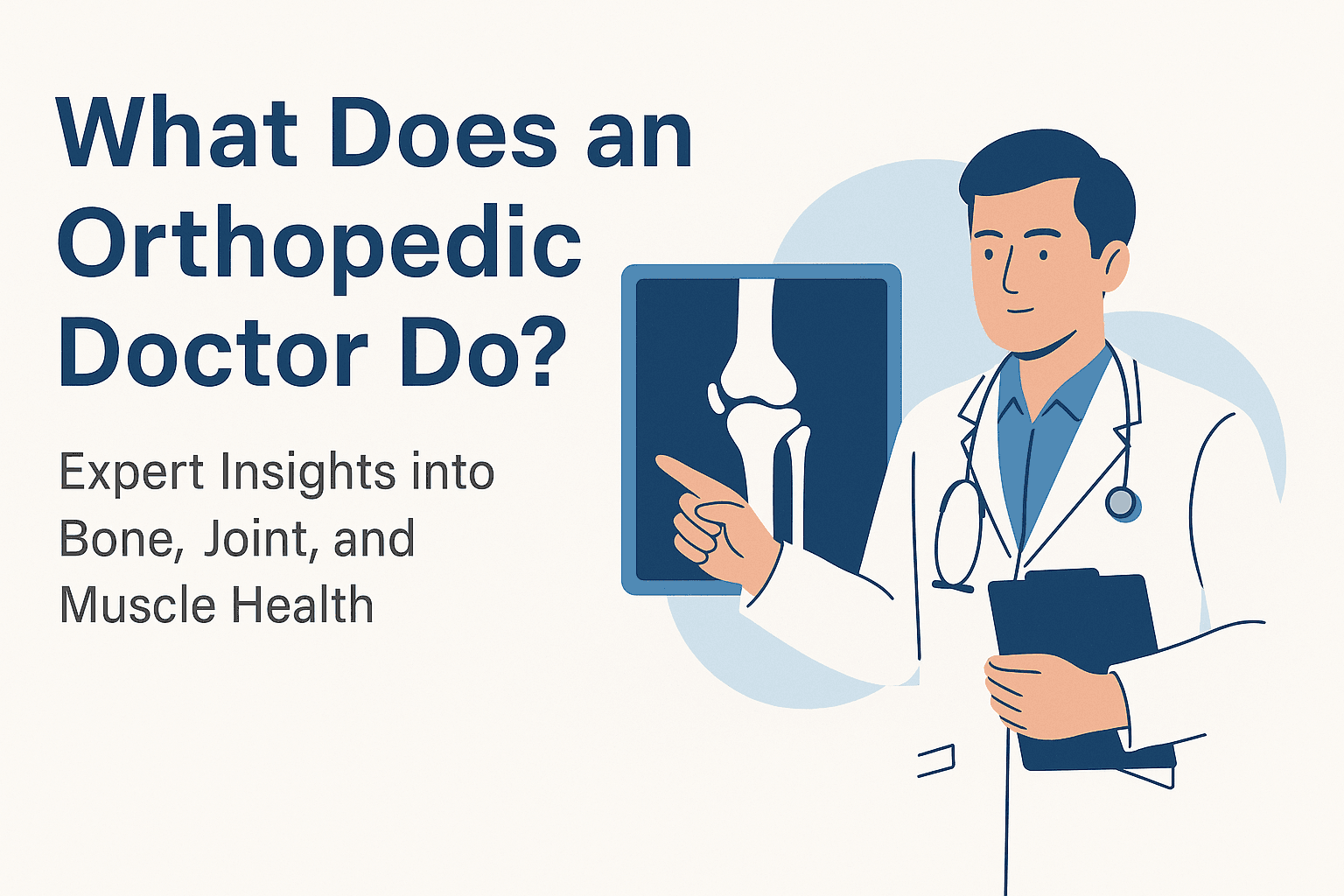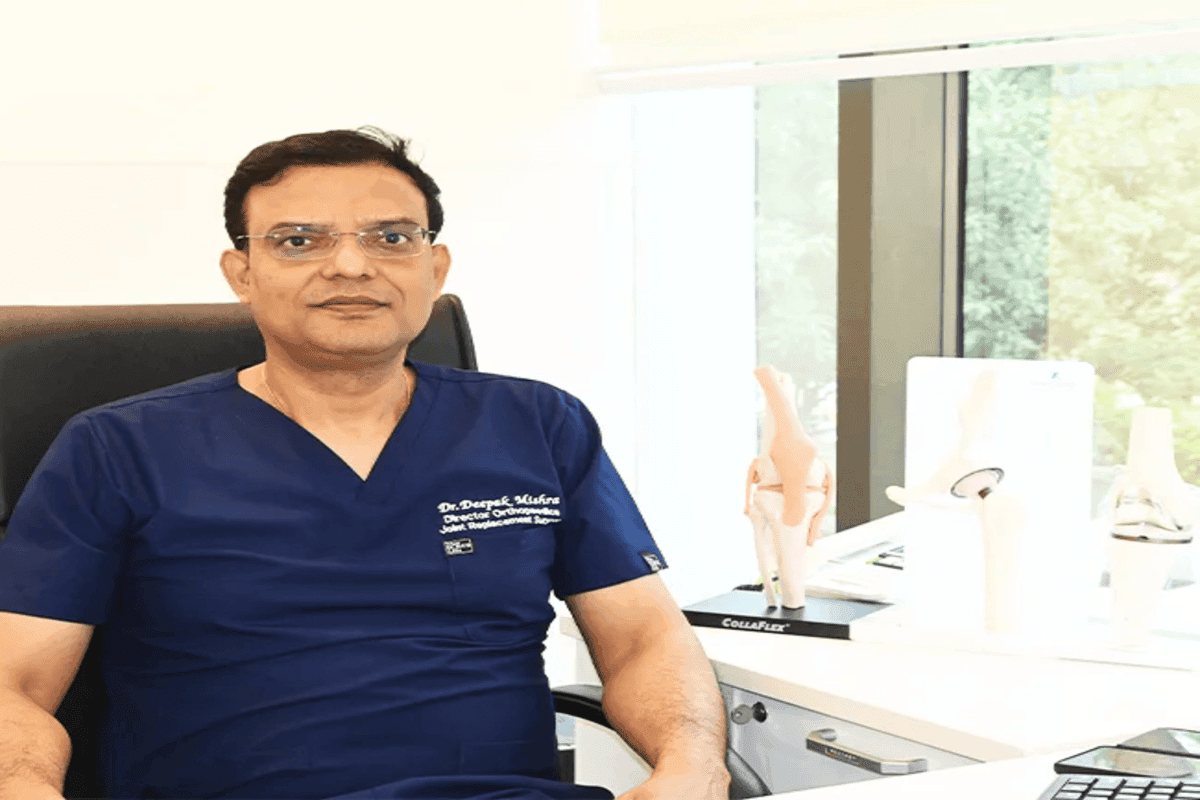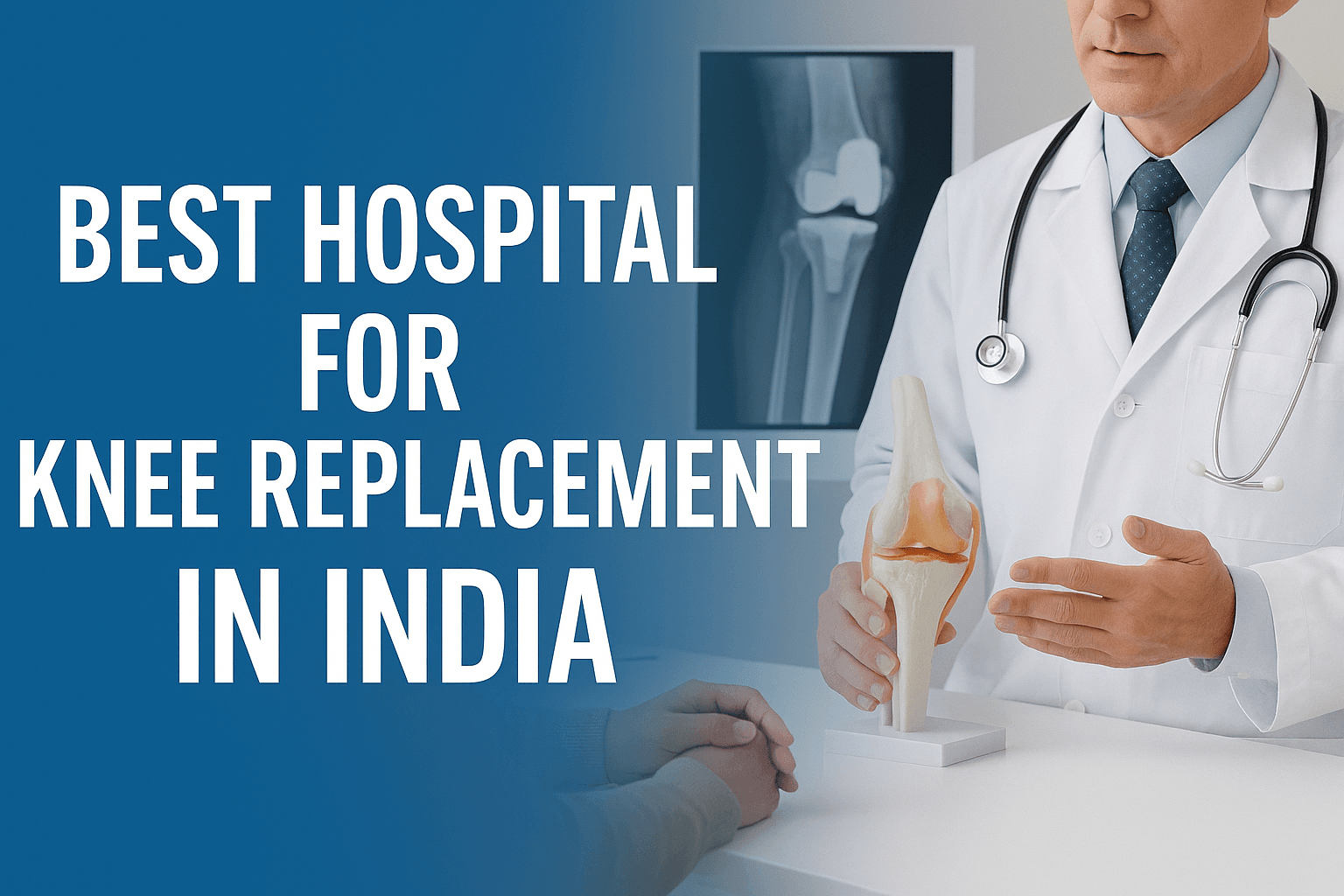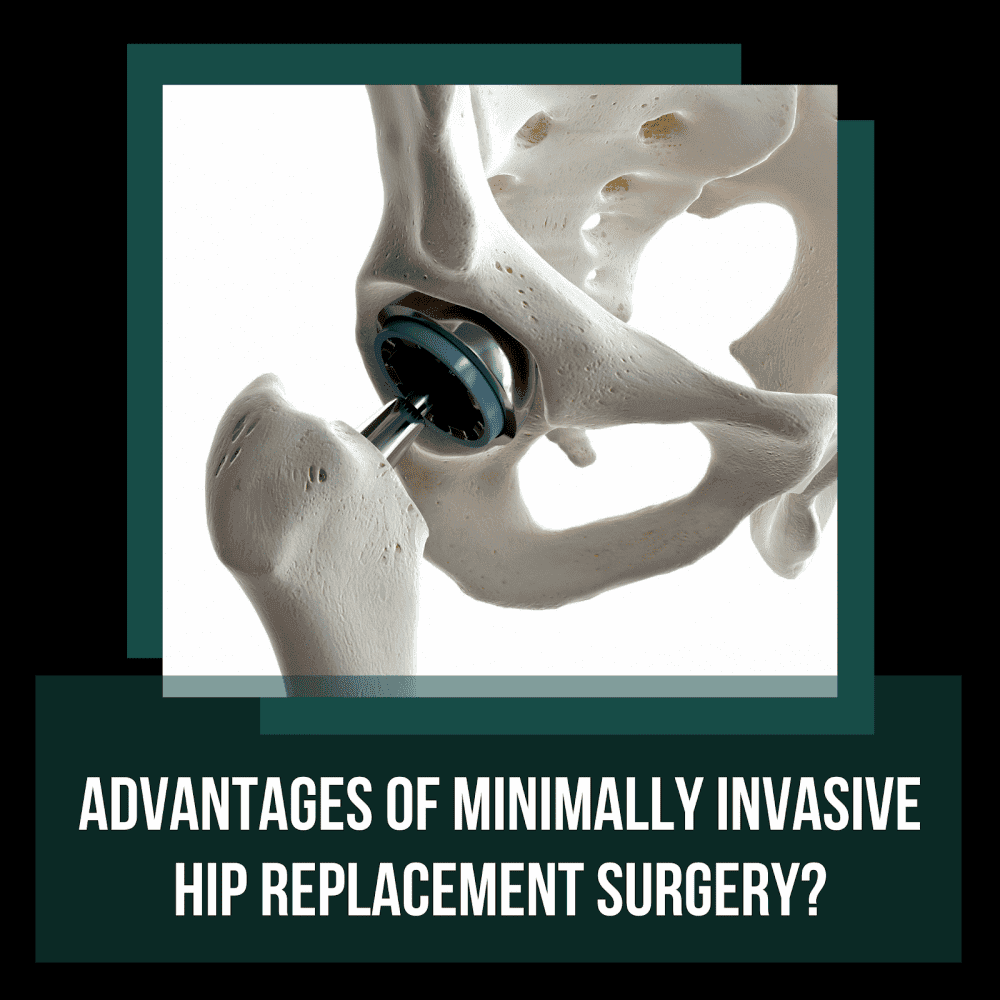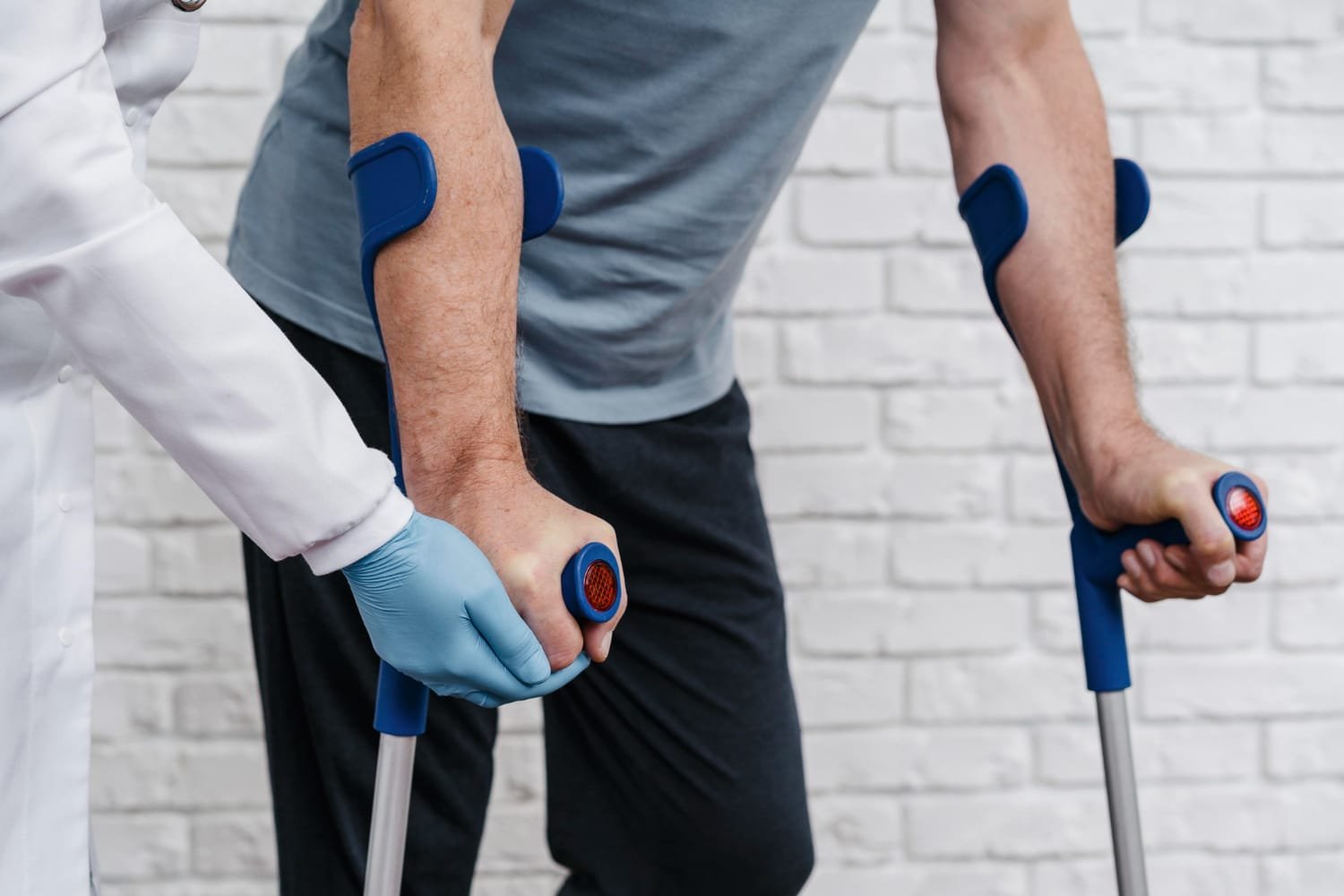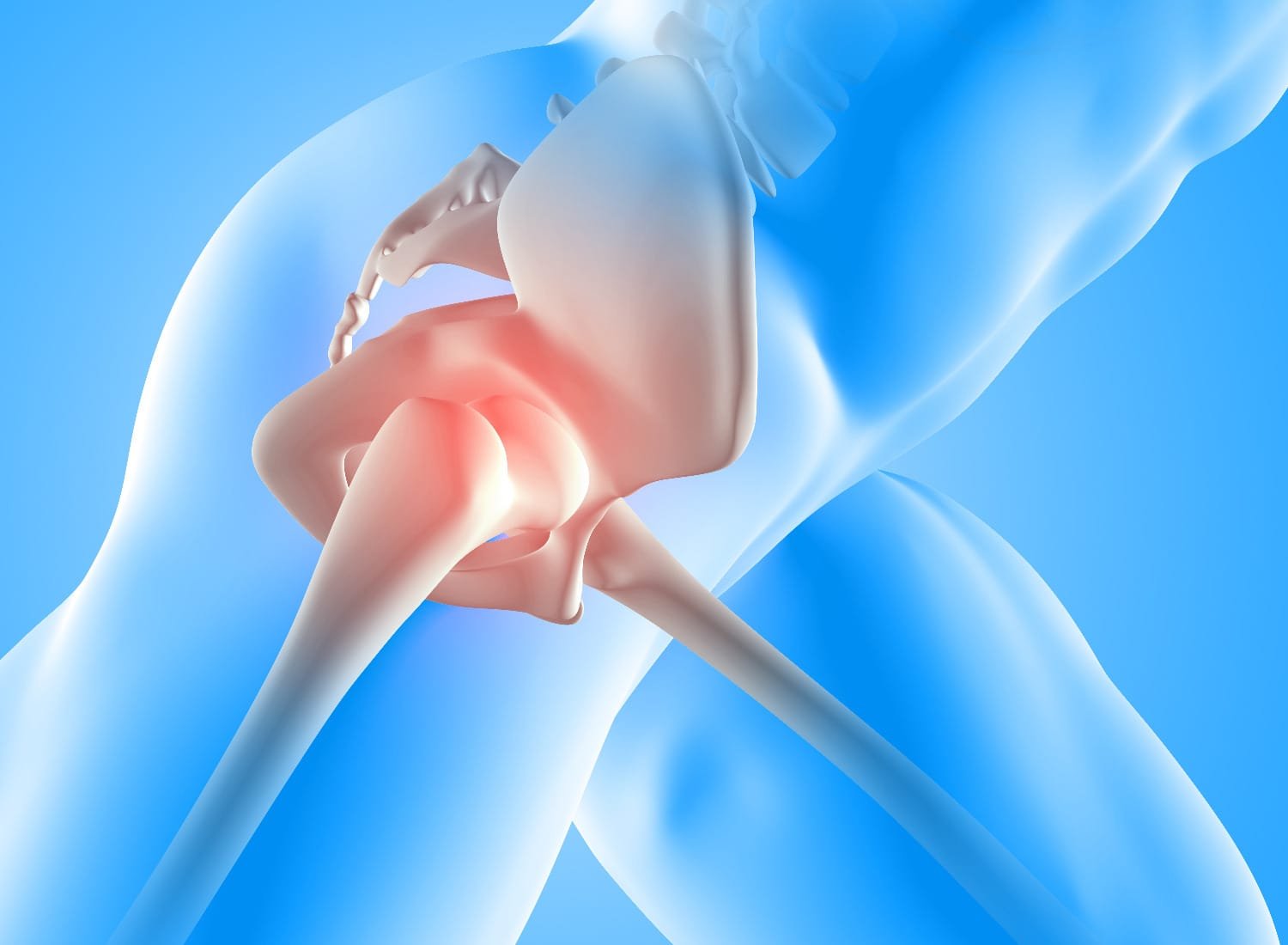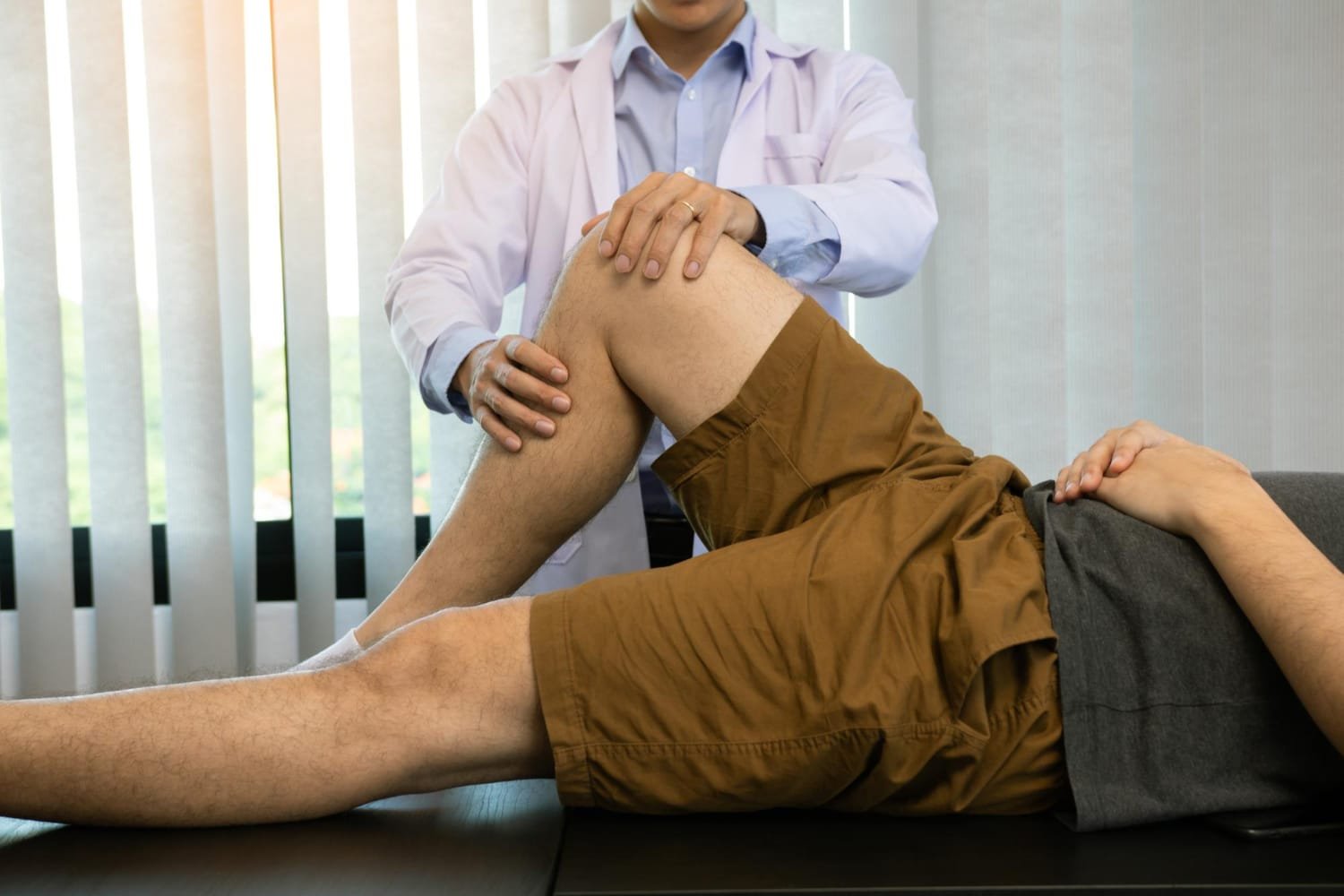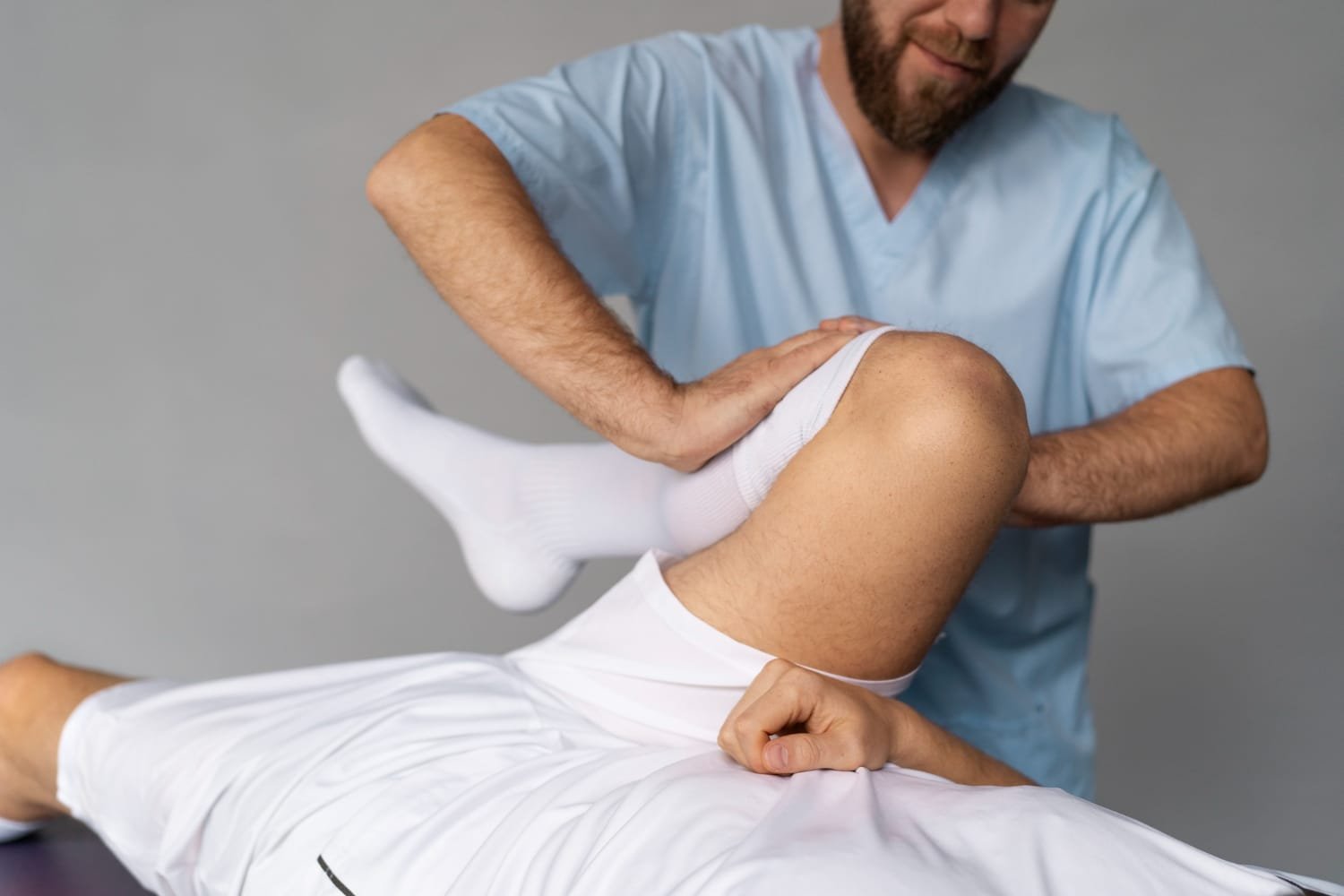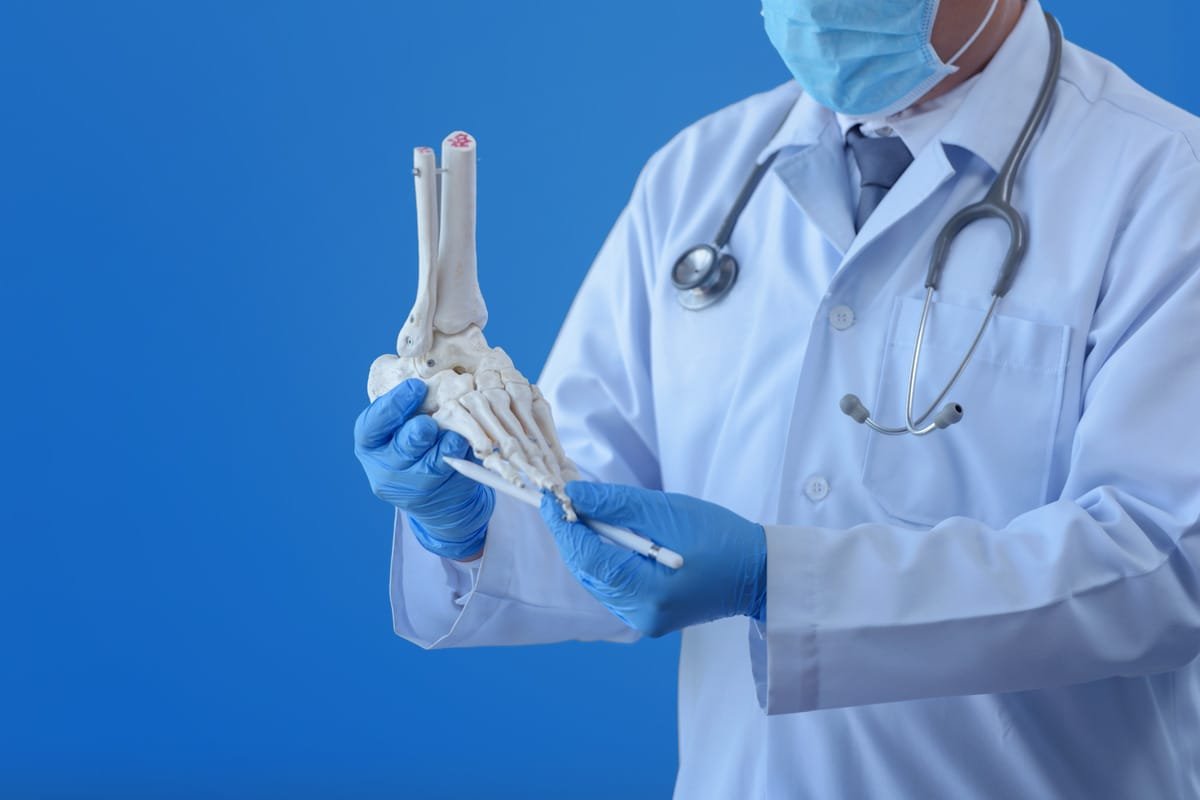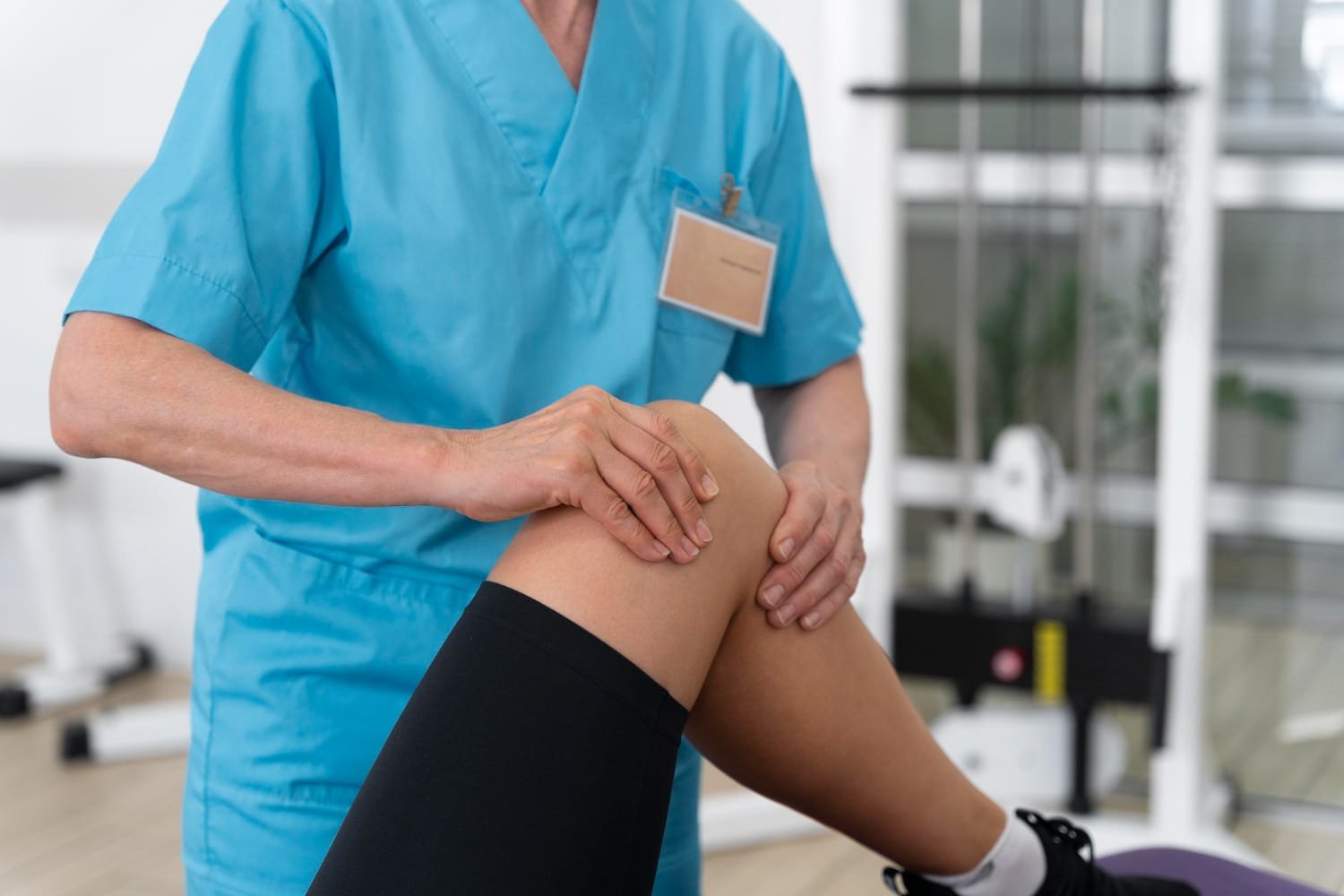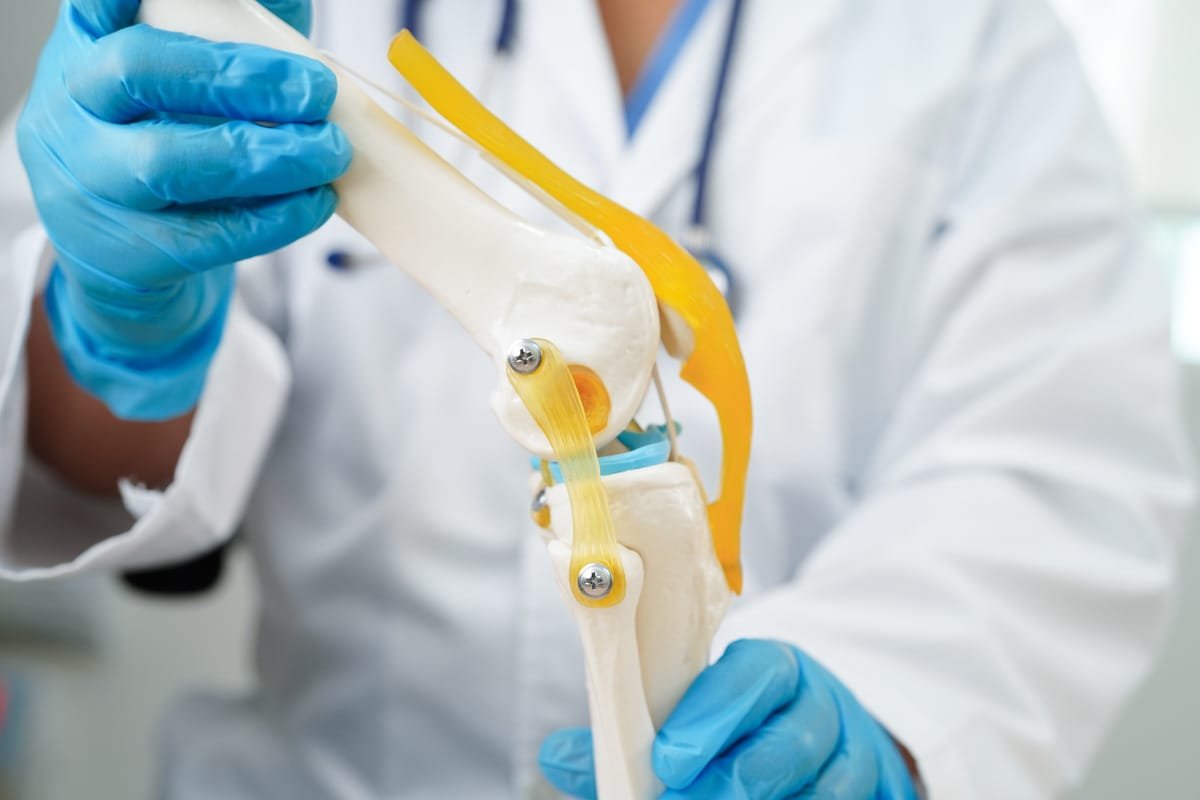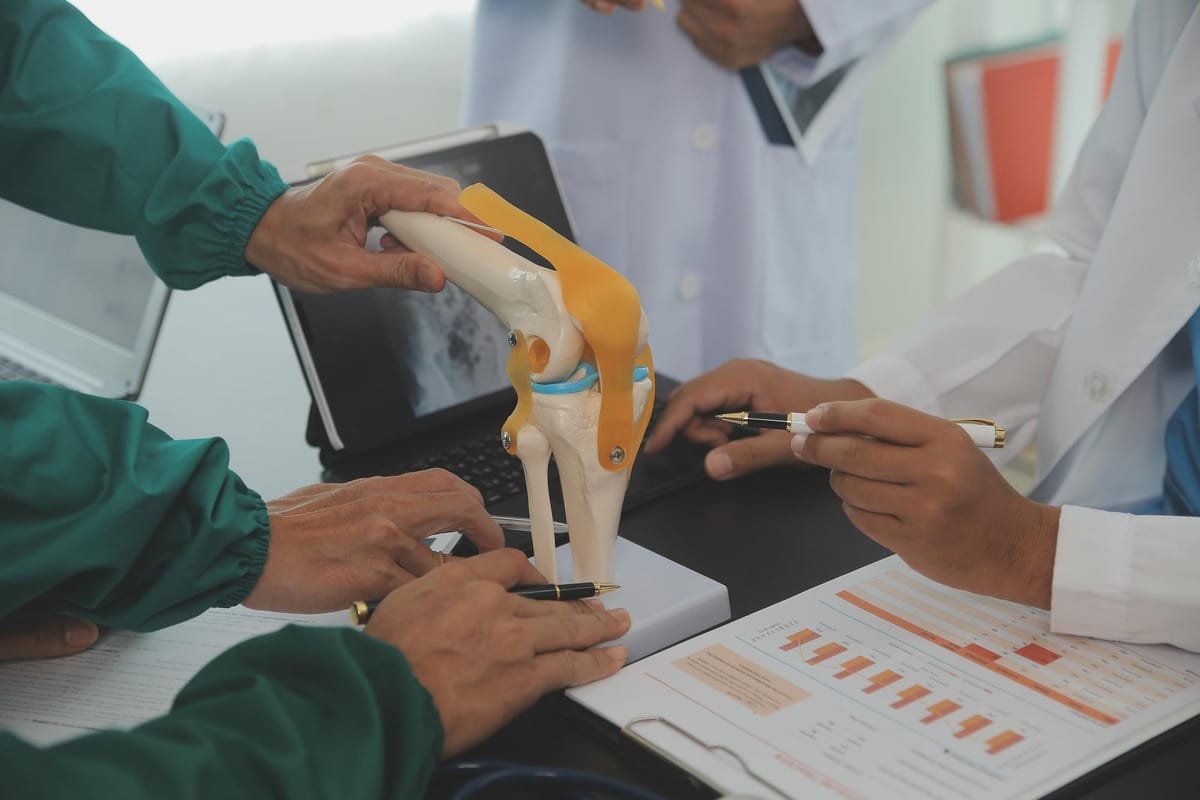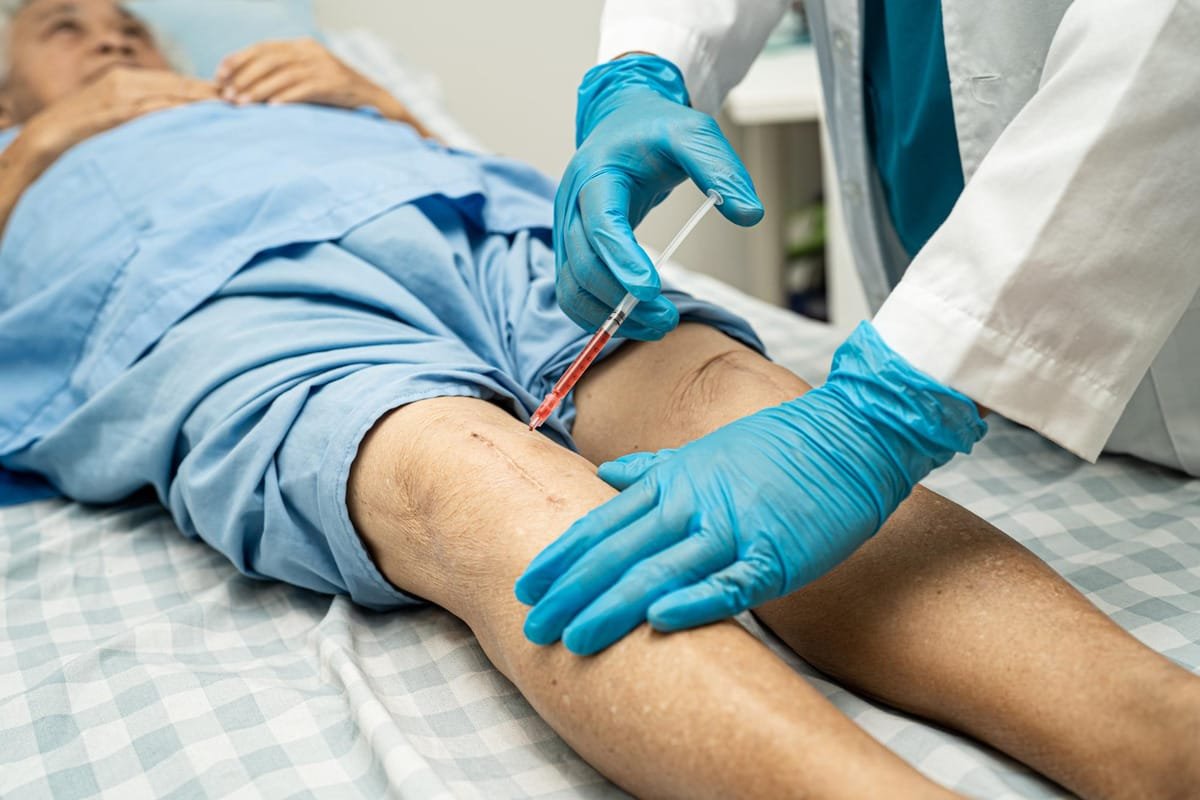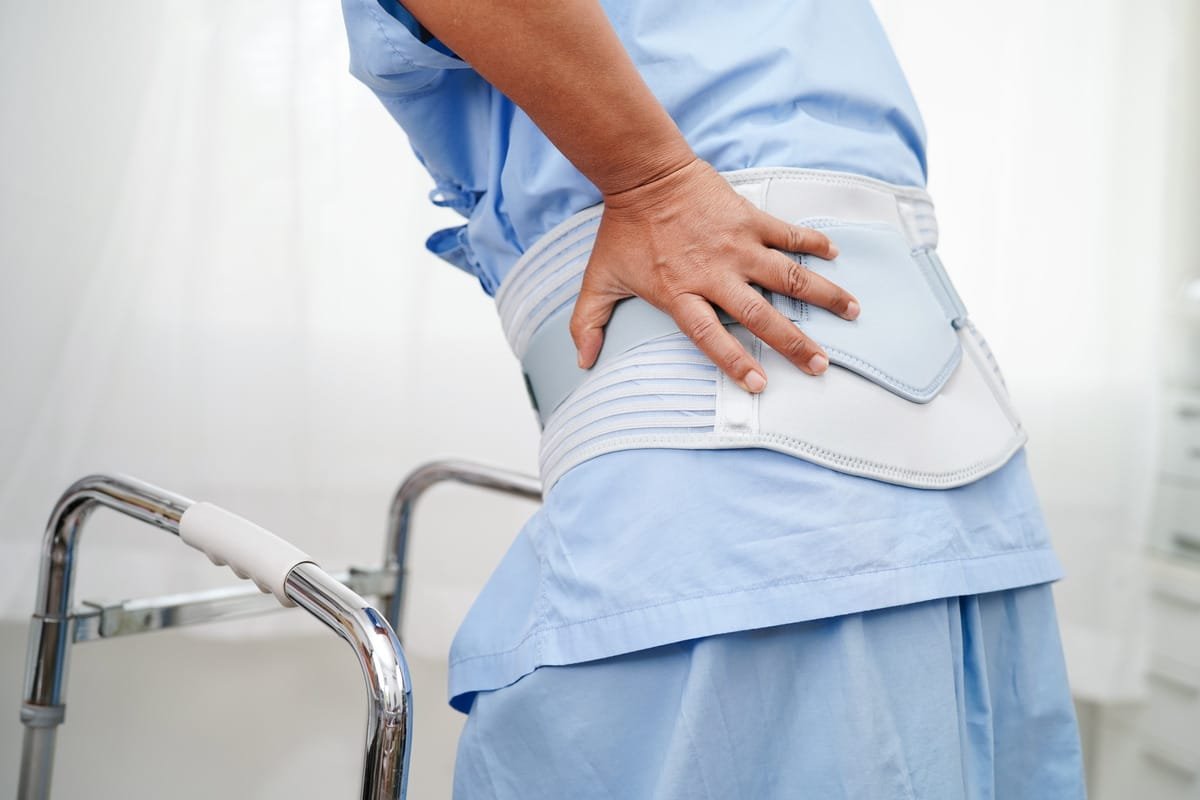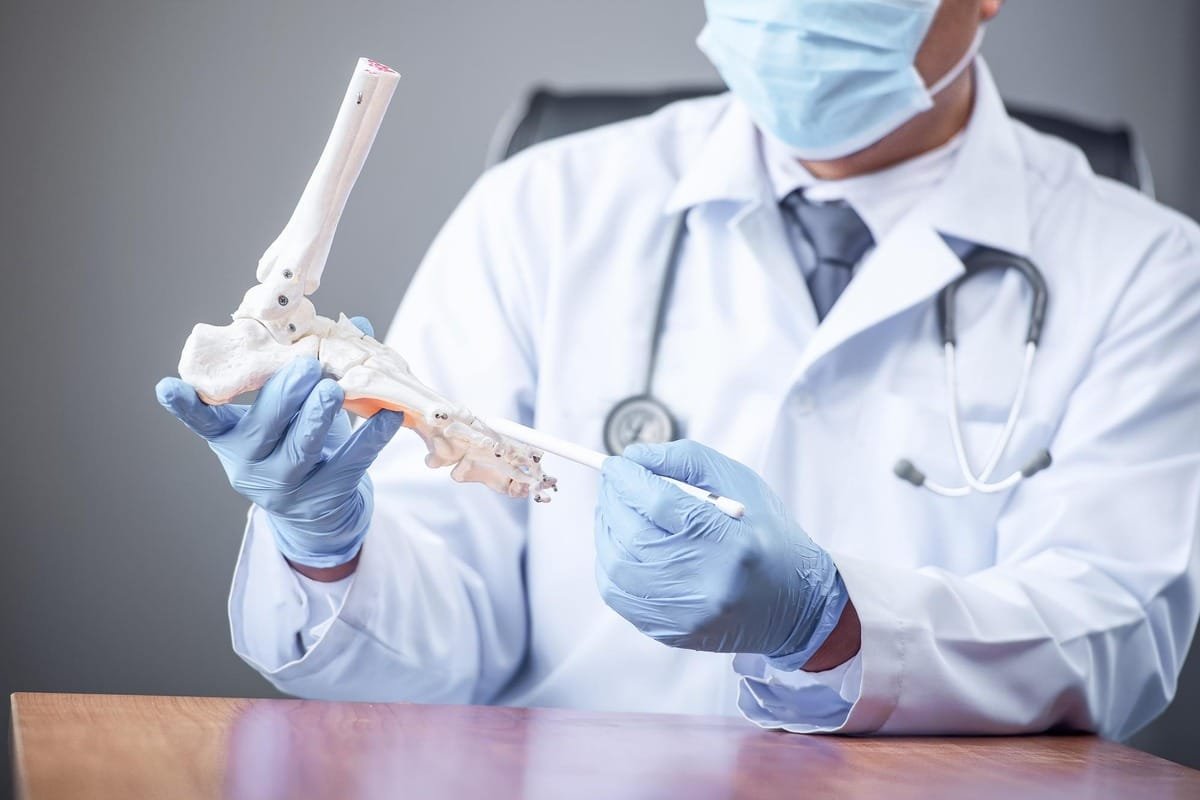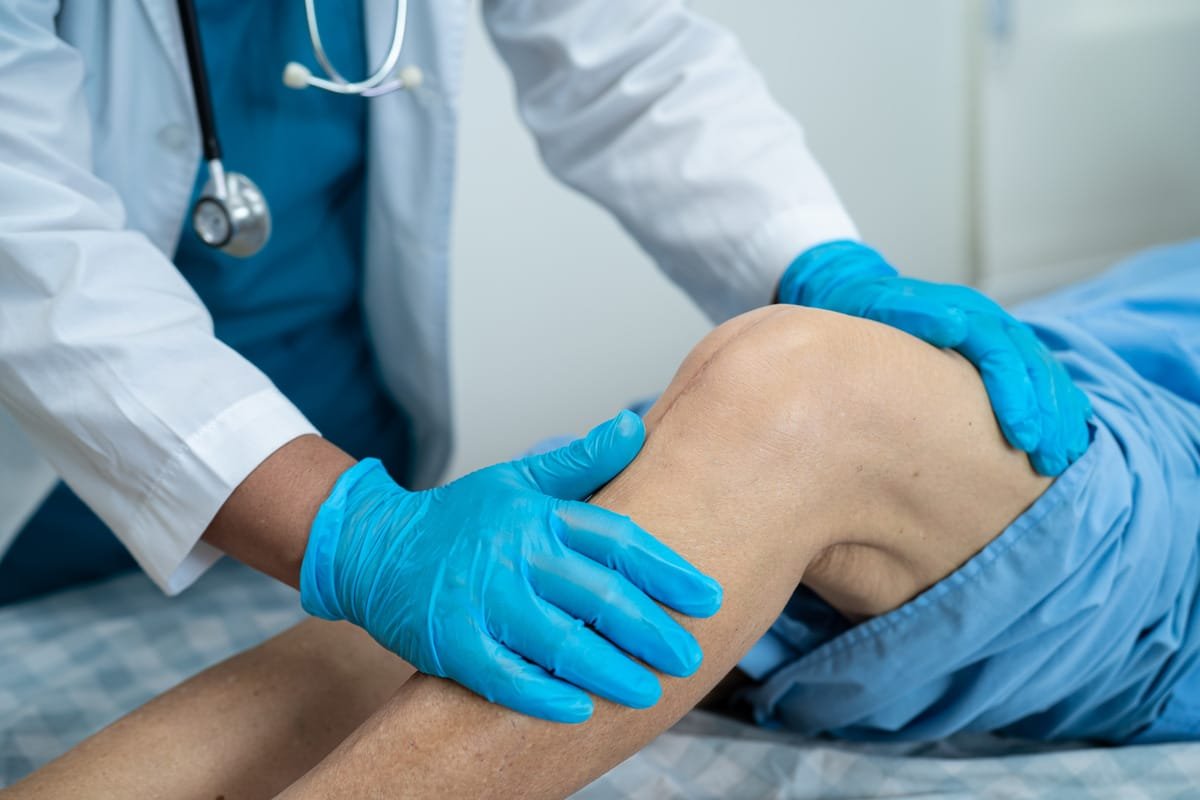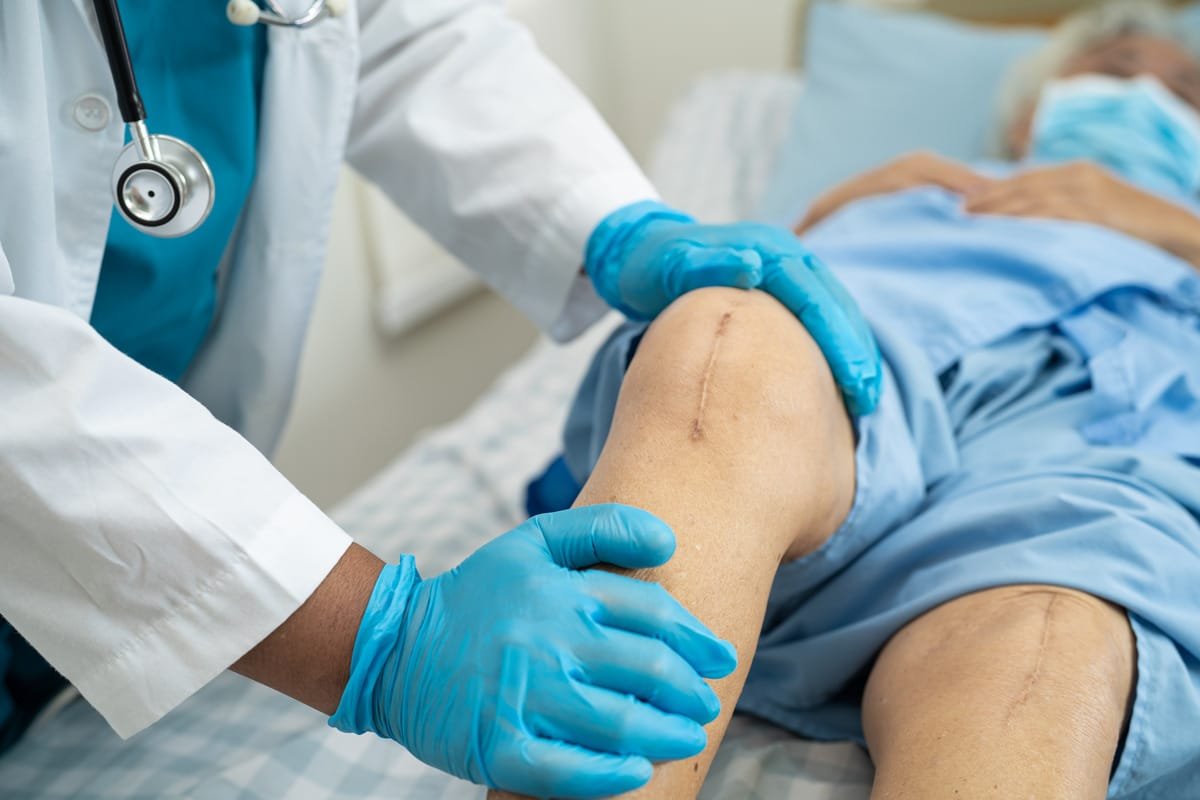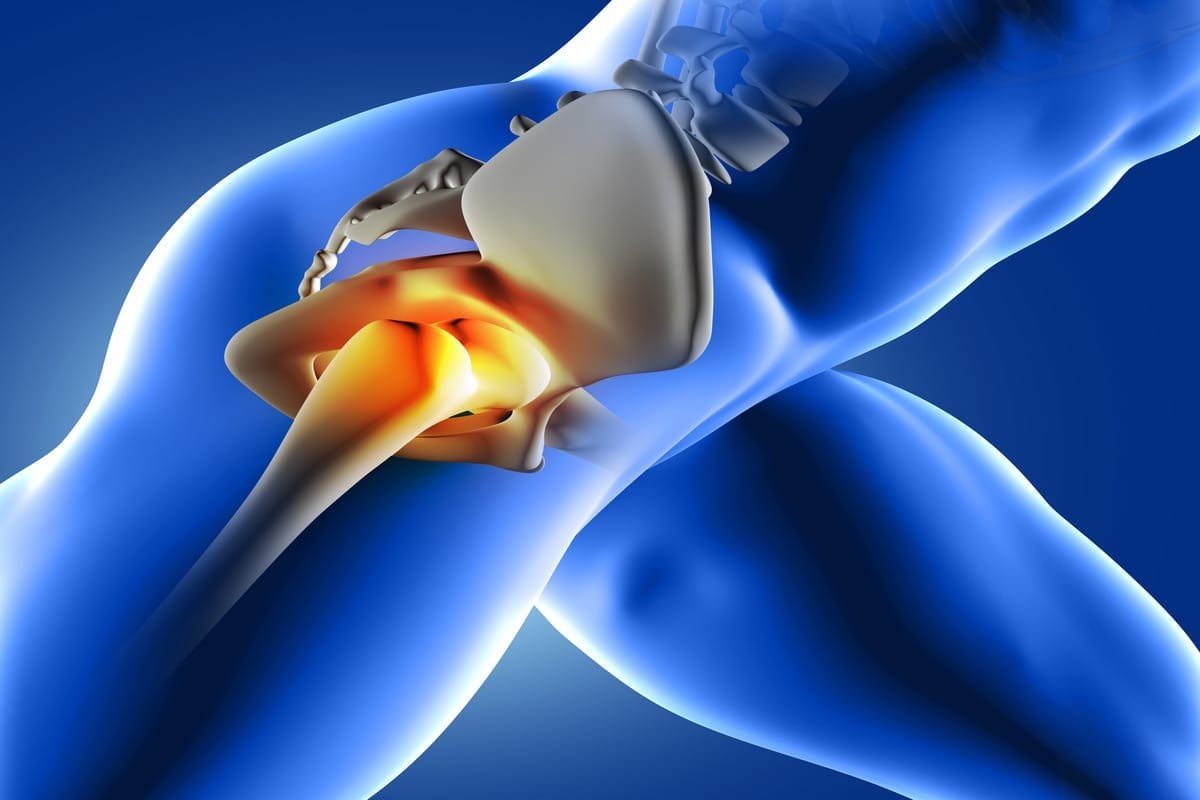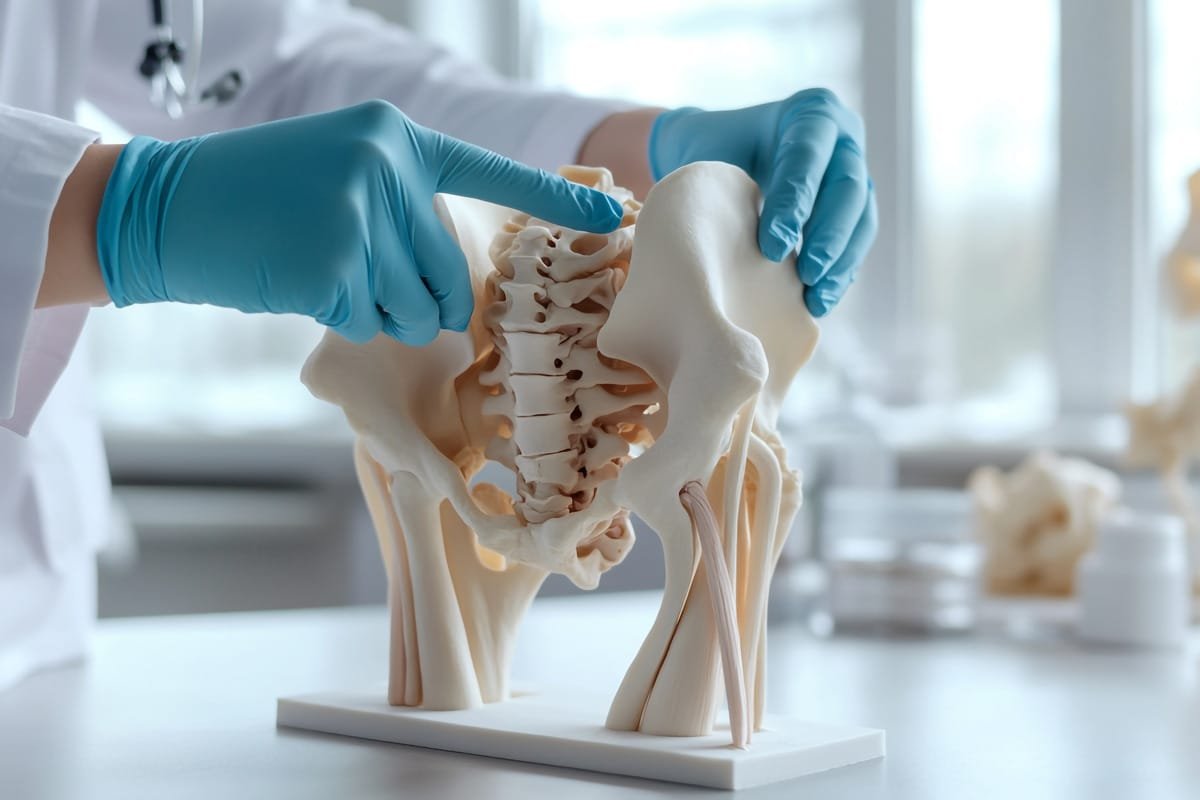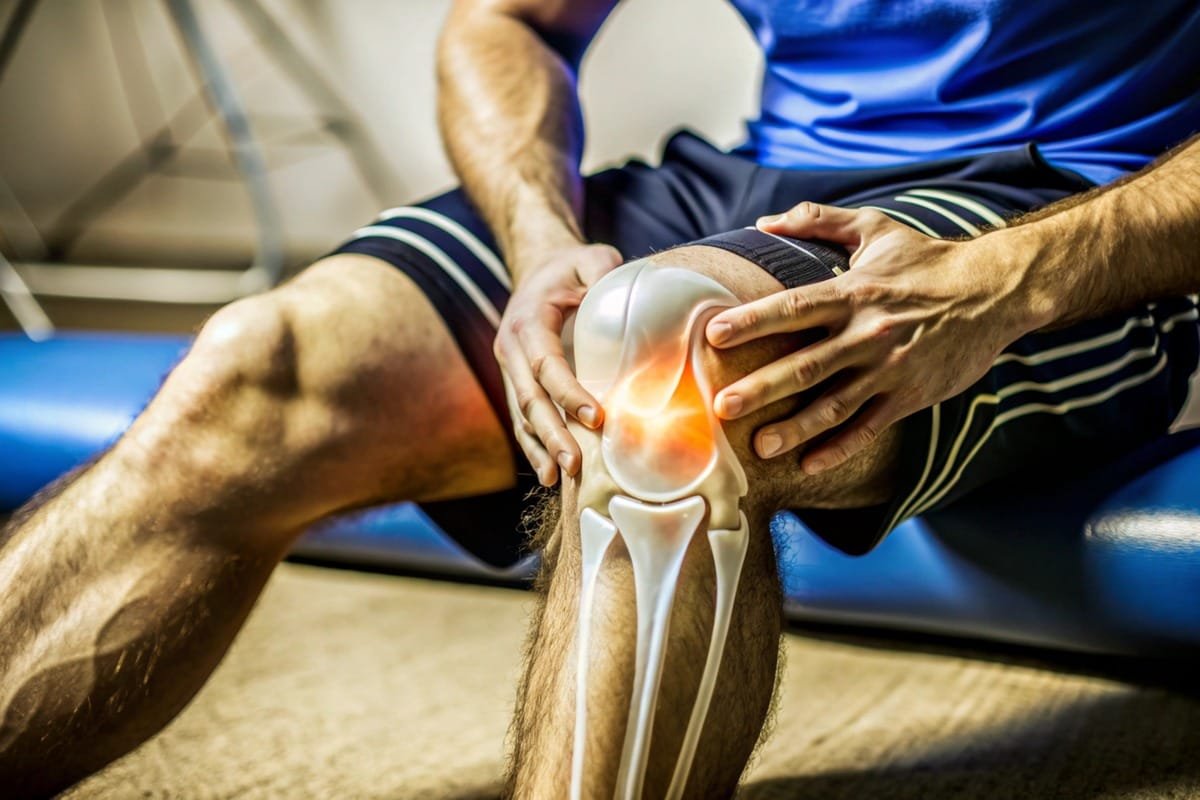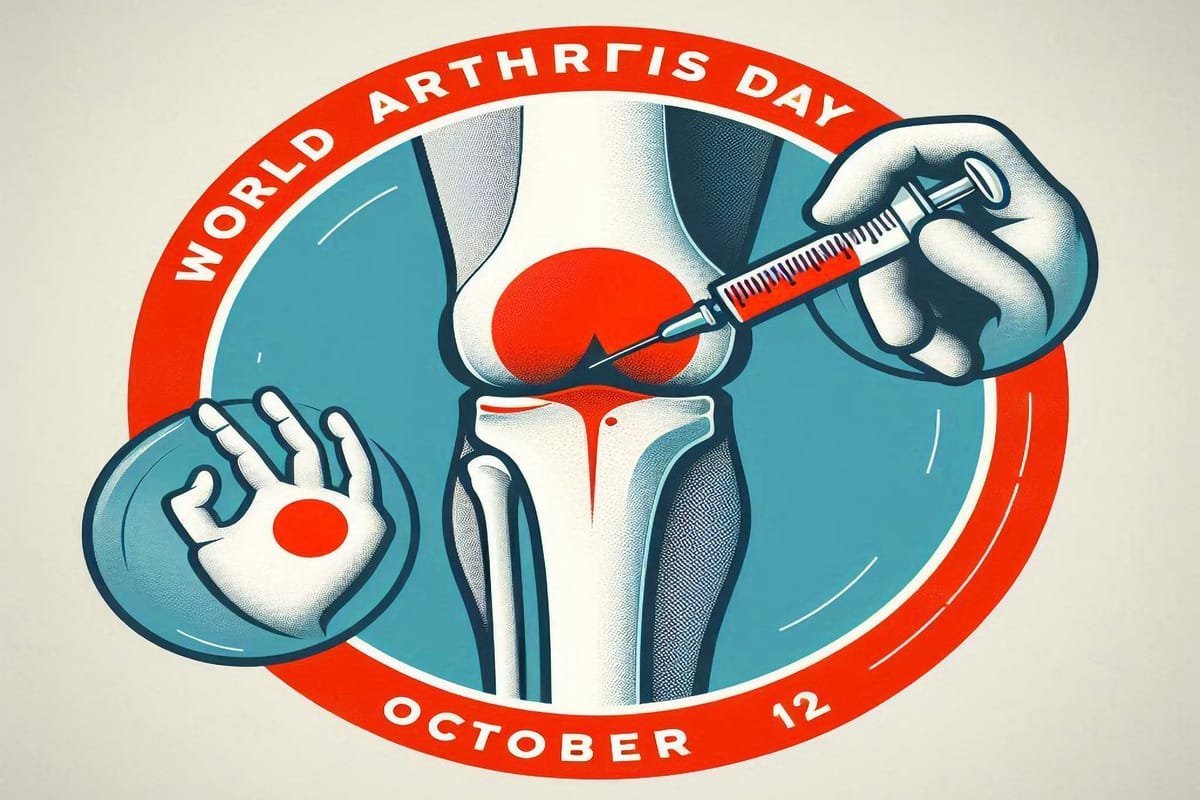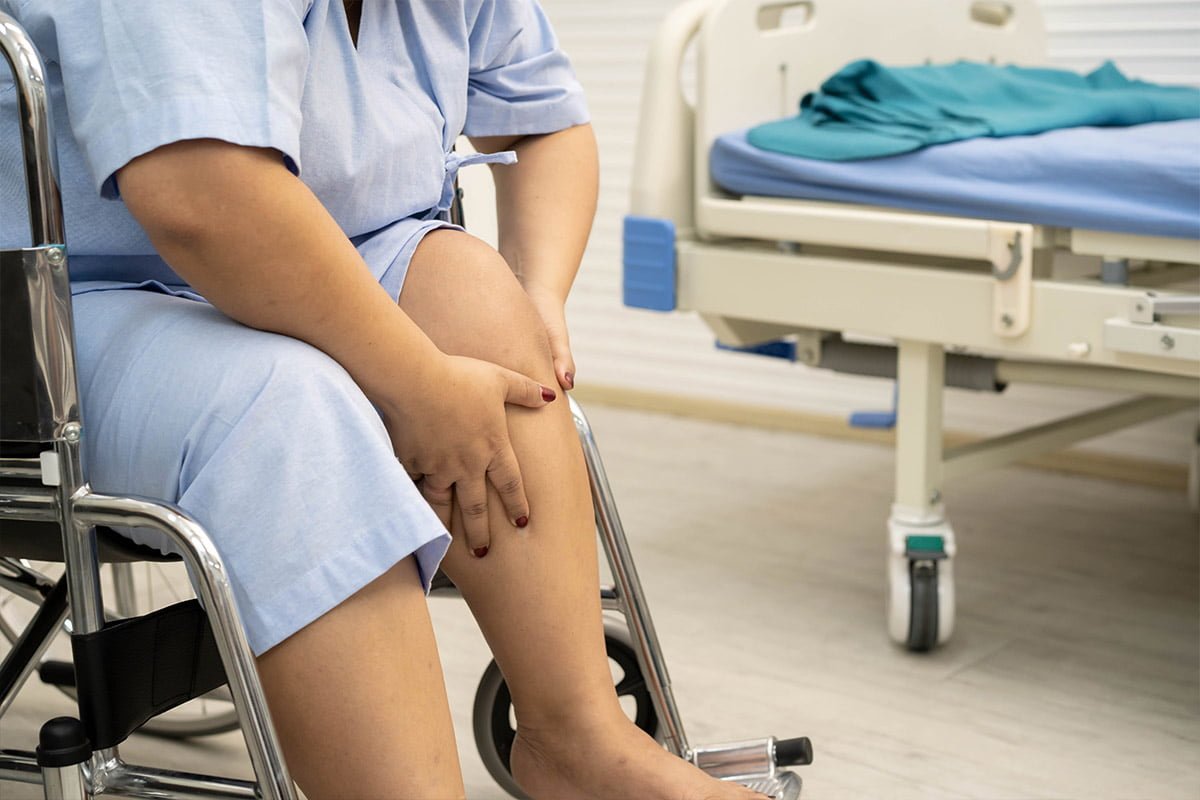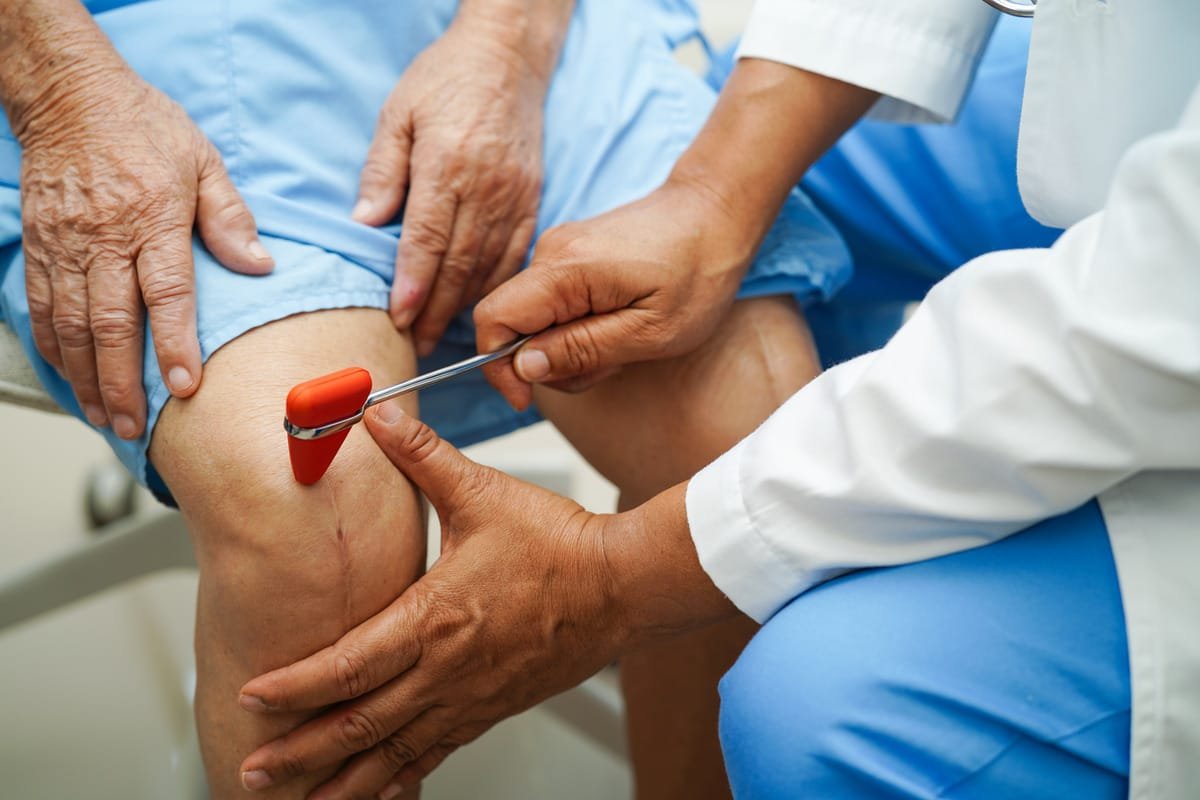
Knee Replacement Surgery: Types, Benefits, and Recovery Timeline
October 28, 2024Knee replacement surgery, also known as knee arthroplasty, is a surgical procedure designed to restore function and reduce pain for individuals suffering from severe knee joint damage. Common causes include osteoarthritis, rheumatoid arthritis, and post-traumatic arthritis. Over time, joint degeneration leads to pain, stiffness, and loss of mobility, and when conservative treatments fail, knee replacement surgery offers a viable solution.
Types of Knee Replacement Surgery
- Total Knee Replacement (TKR)
In total knee replacement, both the ends of the thigh bone (femur) and shin bone (tibia) are resurfaced with metal implants. A plastic insert is placed between them to enable smooth movement. Sometimes, the back of the kneecap (patella) is also resurfaced.- Best For: Patients with widespread arthritis throughout the knee.
- Duration: Surgery takes around 1.5 to 2 hours.
- Partial Knee Replacement (PKR)
This procedure involves replacing only the damaged section of the knee joint while leaving healthy tissues intact.- Best For: Patients with arthritis restricted to a single compartment of the knee (medial, lateral, or patellofemoral).
- Advantages: Faster recovery and less post-operative pain compared to total knee replacement.
- Bilateral Knee Replacement
In cases where both knees are severely affected, surgeons may perform bilateral knee replacement either in one operation or staged across multiple surgeries.- Simultaneous Surgery: Both knees are replaced at once.
- Staged Surgery: Each knee is replaced at different times to reduce surgical risk.
- Revision Knee Replacement
This procedure replaces a previously implanted artificial joint that has become worn, infected, or malfunctioned. Revision surgeries are more complex and require specialized techniques and longer recovery times.
Benefits of Knee Replacement Surgery
- Pain Reduction:
Patients report significant relief from severe joint pain and stiffness, improving sleep and daily function. - Improved Range of Motion:
Restores joint flexibility, allowing for easier movement and physical activity. - Better Joint Alignment:
The surgery corrects deformities like bowlegs (varus deformity) or knock-knees (valgus deformity), resulting in better gait. - Long-Term Durability:
High-quality implants typically last 15 to 20 years, with advancements in materials offering longer lifespans. - Enhanced Quality of Life:
Patients regain independence, participating in everyday tasks such as walking, climbing stairs, and engaging in social activities.
Recovery Timeline
- Immediate Post-Surgery (First 72 Hours)
- Hospitalization: Patients stay in the hospital for monitoring and initial recovery.
- Pain Control: Use of intravenous pain relief and nerve blocks for comfort.
- Start of Physical Therapy: Gentle movements are encouraged within 24 hours to reduce stiffness.
- 1 to 6 Weeks Post-Surgery
- Physical Therapy: Regular sessions focus on regaining range of motion and strength.
- Use of Walking Aids: Crutches, walkers, or canes help with mobility until balance improves.
- Swelling Management: Icing, elevation, and compression stockings are recommended.
- 6 Weeks to 3 Months
- Increased Activity: Patients begin walking short distances unaided and engage in low-impact activities like swimming or cycling.
- Driving: Most individuals can resume driving after 4 to 6 weeks, depending on their progress and which leg was operated on.
- Work: Depending on the nature of the job, some patients return to work by the end of 6 weeks, especially for sedentary roles.
- 3 to 6 Months and Beyond
- Full Range of Motion: Flexibility improves, allowing for near-normal knee function.
- Continued Physiotherapy: Strengthening exercises remain crucial to prevent stiffness and build endurance.
- Return to Recreational Activities: Low-impact activities like golf, walking, or swimming are often encouraged, though running or contact sports are discouraged to protect the joint.
Tips for a Smooth Recovery
- Follow the Exercise Regimen:
Physical therapy exercises are essential for regaining strength and range of motion. - Stick to Medications:
Pain relief and anti-inflammatory medications ensure comfort during recovery. - Monitor for Complications:
Watch for signs of infection (fever, redness, or unusual swelling) and report to your doctor immediately. - Modify Your Home:
Arrange for grab bars in bathrooms, raised toilet seats, and remove rugs or clutter to avoid falls. - Adopt a Healthy Diet:
A balanced diet aids healing by supplying essential nutrients for tissue repair.
Potential Risks and Complications
- Infection:
Though rare, infections can occur in the surgical site or around the implant. - Blood Clots:
There is a risk of developing clots in the legs (deep vein thrombosis) after surgery. Blood thinners may be prescribed. - Loosening of the Implant:
Over time, the implant may loosen or wear out, especially with high-impact activities. - Nerve or Blood Vessel Damage:
Damage to surrounding nerves or blood vessels is uncommon but may happen during surgery. - Stiffness or Limited Range of Motion:
Some patients may experience stiffness even after rehabilitation. Additional therapy may be needed.
Meet Dr. Deepak Mishra: The Best Knee Replacement Surgeon in Faridabad
Dr. Deepak Mishra is a highly regarded orthopedic surgeon with over 26 years of experience, specializing in knee replacement surgeries. Known for his expertise and compassionate care, Dr. Mishra has successfully treated countless patients suffering from debilitating knee conditions. His mastery in performing total, partial, bilateral, and revision knee replacements ensures that patients receive customized solutions tailored to their needs.
With his extensive knowledge and advanced surgical techniques, Dr. Mishra has earned a reputation as the best knee replacement surgeon in Faridabad. Patients under his care benefit not only from his surgical skills but also from personalized recovery plans that facilitate quicker rehabilitation and improved quality of life.
Conclusion
Knee replacement surgery offers a life-changing option for individuals suffering from chronic knee pain and reduced mobility. With various surgical options tailored to the patient’s specific condition and a well-structured recovery plan, the procedure restores functionality and improves quality of life. Consulting with an experienced orthopedic surgeon like Dr. Deepak Mishra helps patients determine which type of surgery suits their condition and prepares them for a successful rehabilitation journey. Staying committed to physical therapy and healthy habits ensures long-lasting results.
Recent Blogs
-
 Who Is Not Suitable for Knee Replacement Surgery?
Who Is Not Suitable for Knee Replacement Surgery?- 12, February 2026
-
 Best Meniscus Injury Surgeon in Faridabad
Best Meniscus Injury Surgeon in Faridabad- 9, February 2026
-
 How Obesity Affects Knee Health & When to Consider Knee Replacement
How Obesity Affects Knee Health & When to Consider Knee Replacement- 6, February 2026
-
 Knee Pain After Sitting for Long Hours – What to Do
Knee Pain After Sitting for Long Hours – What to Do- 3, February 2026
-
 Most Common Sports Injuries and How to Prevent Them
Most Common Sports Injuries and How to Prevent Them- 26, January 2026
-
 Walking, Stairs & Daily Activities After Knee Replacement
Walking, Stairs & Daily Activities After Knee Replacement- 22, January 2026
-
 When Knee Pain Needs Medical Attention: Red Flags to Watch
When Knee Pain Needs Medical Attention: Red Flags to Watch- 19, January 2026
-
 Cartilage Damage in Sports: Early Signs Athletes Should Not Ignore
Cartilage Damage in Sports: Early Signs Athletes Should Not Ignore- 15, January 2026
-
 Can You Sit Cross-Legged After Knee Replacement?
Can You Sit Cross-Legged After Knee Replacement?- 13, January 2026
-
 Types of Knee Implants
Types of Knee Implants- 13, January 2026
-
 Special Tests for Knee Osteoarthritis
Special Tests for Knee Osteoarthritis- 7, January 2026
-
 Knee Operation Types: A Comprehensive Guide
Knee Operation Types: A Comprehensive Guide- 7, January 2026
-
 Difference Between Knee Arthritis, Meniscus Tear, and Ligament Injury
Difference Between Knee Arthritis, Meniscus Tear, and Ligament Injury- 30, December 2025
-
 Knee Pain While Walking: When Should You Worry?
Knee Pain While Walking: When Should You Worry?- 30, December 2025
-
 What Happens If Knee Replacement Is Delayed Too Long?
What Happens If Knee Replacement Is Delayed Too Long?- 24, December 2025
-
 How Cartilage Loss Leads to Chronic Knee Pain
How Cartilage Loss Leads to Chronic Knee Pain- 24, December 2025
-
 ACL Tears in Athletes: Symptoms, Treatment Options & Recovery
ACL Tears in Athletes: Symptoms, Treatment Options & Recovery- 19, November 2025
-
 Sports Injuries That Often Lead to Knee Replacement
Sports Injuries That Often Lead to Knee Replacement- 19, November 2025
-
 Orthopedic Care for Elderly Patients — A Complete Guide
Orthopedic Care for Elderly Patients — A Complete Guide- 12, November 2025
-
 How Long Do Knee Implants Last? (10–20 Year Longevity Guide)
How Long Do Knee Implants Last? (10–20 Year Longevity Guide)- 12, November 2025
-
 Importance of Early Diagnosis in Bone and Joint Problems
Importance of Early Diagnosis in Bone and Joint Problems- 28, October 2025
-
 Best Treatment Options for Sports Injuries
Best Treatment Options for Sports Injuries- 28, October 2025
-
 The Difference Between ACL Tear, Sprain, and Rupture
The Difference Between ACL Tear, Sprain, and Rupture- 16, October 2025
-
 Post-ACL Surgery Do’s and Don’ts
Post-ACL Surgery Do’s and Don’ts- 16, October 2025
-
 Early Signs You Might Have an ACL Injury (and When to See a Doctor)
Early Signs You Might Have an ACL Injury (and When to See a Doctor)- 16, October 2025
-
 Does Insurance Cover Robotic Knee Replacement Surgery?
Does Insurance Cover Robotic Knee Replacement Surgery?- 6, October 2025
-
 When Can You Return to Sports After Robotic Knee Replacement?
When Can You Return to Sports After Robotic Knee Replacement?- 6, October 2025
-
 Impact of Obesity on Knee Replacement Surgery and Recovery
Impact of Obesity on Knee Replacement Surgery and Recovery- 30, September 2025
-
 Early vs. Delayed Knee Replacement: Which Is Better?
Early vs. Delayed Knee Replacement: Which Is Better?- 30, September 2025
-
 How Durable Are Knee Implants? A Complete Guide
How Durable Are Knee Implants? A Complete Guide- 24, September 2025
-
 Can You Play Sports After Knee Replacement Surgery?
Can You Play Sports After Knee Replacement Surgery?- 24, September 2025
-
 Key Benefits of Revision Hip Replacement You Should Know
Key Benefits of Revision Hip Replacement You Should Know- 15, September 2025
-
 Revision Hip Replacement vs. Primary Hip Replacement: Key Differences
Revision Hip Replacement vs. Primary Hip Replacement: Key Differences- 15, September 2025
-

-
 Total Knee Replacement Complications: What You Need to Know
Total Knee Replacement Complications: What You Need to Know- 5, September 2025
-
 Can You Play Sports After Hip Replacement Surgery?
Can You Play Sports After Hip Replacement Surgery?- 26, August 2025
-
 Preparing for Knee Replacement: Do’s and Don’ts Before Surgery
Preparing for Knee Replacement: Do’s and Don’ts Before Surgery- 26, August 2025
-

-
 What to Know About Knee Replacement Revision Surgery
What to Know About Knee Replacement Revision Surgery- 18, August 2025
-
 Cost of Hip Replacement in India – What Patients Should Know
Cost of Hip Replacement in India – What Patients Should Know- 11, August 2025
-

-
 Who Is the Best Orthopedic Doctor for Sports Injuries?
Who Is the Best Orthopedic Doctor for Sports Injuries?- 27, July 2025
-
 Success Rate of Robotic Knee Replacement in India
Success Rate of Robotic Knee Replacement in India- 27, July 2025
-
 Why Surgeons Are Switching to Robotic Knee Replacements
Why Surgeons Are Switching to Robotic Knee Replacements- 15, July 2025
-
 Do’s and Don’ts After Knee Replacement Surgery
Do’s and Don’ts After Knee Replacement Surgery- 15, July 2025
-
 Best Robotic Knee Replacement in India
Best Robotic Knee Replacement in India- 7, July 2025
-
 Affordable Robotic Knee Replacement in India
Affordable Robotic Knee Replacement in India- 7, July 2025
-

-

-

-

-

-

-

-
 Orthopedic Meaning, Definition, Types, and More
Orthopedic Meaning, Definition, Types, and More- 6, June 2025
-
 What Are the Most Common Orthopedic Surgeries?
What Are the Most Common Orthopedic Surgeries?- 24, May 2025
-
 What Does an Orthopedic Doctor Do?
What Does an Orthopedic Doctor Do?- 24, May 2025
-

-

-

-
 Best Orthopedic Doctor for Knee Pain in Faridabad
Best Orthopedic Doctor for Knee Pain in Faridabad- 12, May 2025
-
 How to Prevent Knee Pain with Orthopedic Expert Tips
How to Prevent Knee Pain with Orthopedic Expert Tips- 29, April 2025
-

-
 Best Orthopedic Treatment in Faridabad: What You Should Know
Best Orthopedic Treatment in Faridabad: What You Should Know- 29, April 2025
-

-

-
 Best Knee Replacement Surgeon in Mathura
Best Knee Replacement Surgeon in Mathura- 14, April 2025
-
 Best Knee Replacement Surgeon in Hodal
Best Knee Replacement Surgeon in Hodal- 14, April 2025
-
 Best Knee Replacement Surgeon in Palwal
Best Knee Replacement Surgeon in Palwal- 14, April 2025
-

-

-

-
 Benefits of Minimally Invasive Knee Surgery
Benefits of Minimally Invasive Knee Surgery- 24, March 2025
-
 Best knee Replacement Surgeon in India
Best knee Replacement Surgeon in India- 17, March 2025
-

-
 How to Recover Quickly After Knee Replacement Surgery
How to Recover Quickly After Knee Replacement Surgery- 10, March 2025
-

-

-

-
 Minimally Invasive Arthroplasty: Benefits and Recovery Advantages
Minimally Invasive Arthroplasty: Benefits and Recovery Advantages- 24, February 2025
-
 Common Mistakes to Avoid After Joint Replacement Surgery
Common Mistakes to Avoid After Joint Replacement Surgery- 24, February 2025
-
 Choosing the Right Hip Replacement Surgeon: A Comprehensive Guide
Choosing the Right Hip Replacement Surgeon: A Comprehensive Guide- 17, February 2025
-
 Restoring Mobility: The Role of Knee Replacement Doctors
Restoring Mobility: The Role of Knee Replacement Doctors- 17, February 2025
-
 Orthopedic Trauma Care for Athletes
Orthopedic Trauma Care for Athletes- 6, February 2025
-
 Best Doctor for ACL Tear Treatment
Best Doctor for ACL Tear Treatment- 6, February 2025
-
 Best Sports Medicine Doctor for Knee Injuries
Best Sports Medicine Doctor for Knee Injuries- 6, February 2025
-
 Orthopedic Surgeons: 7 Things You Need to Know
Orthopedic Surgeons: 7 Things You Need to Know- 27, January 2025
-
 Best Joint Replacement Surgeon in Greater Faridabad
Best Joint Replacement Surgeon in Greater Faridabad- 27, January 2025
-
 Best Knee Replacement Surgeon in Palwal
Best Knee Replacement Surgeon in Palwal- 20, January 2025
-
 Best Knee Replacement Surgeon in South Delhi
Best Knee Replacement Surgeon in South Delhi- 20, January 2025
-
 Signs You May Need a Knee Replacement: Insights from a Surgeon
Signs You May Need a Knee Replacement: Insights from a Surgeon- 13, January 2025
-
 Restoring Mobility: The Role of Knee Replacement Doctor
Restoring Mobility: The Role of Knee Replacement Doctor- 13, January 2025
-
 Robotic Knee Replacement Surgery in Delhi
Robotic Knee Replacement Surgery in Delhi- 30, December 2024
-
 Robotic Orthopedic Surgery: Revolutionizing Joint Replacement and Repair
Robotic Orthopedic Surgery: Revolutionizing Joint Replacement and Repair- 30, December 2024
-
 Robotic Knee Replacement vs. Traditional Surgery: A Comparative Guide
Robotic Knee Replacement vs. Traditional Surgery: A Comparative Guide- 23, December 2024
-
 How to Make Joints Stronger: A Comprehensive Guide
How to Make Joints Stronger: A Comprehensive Guide- 23, December 2024
-
 Common Knee Conditions and How a Knee Surgeon Can Help
Common Knee Conditions and How a Knee Surgeon Can Help- 16, December 2024
-

-

-
 Orthopedic Surgeons: 7 Things You Need to Know
Orthopedic Surgeons: 7 Things You Need to Know- 6, December 2024
-
 Top 5 Mistakes After Knee Replacement
Top 5 Mistakes After Knee Replacement- 25, November 2024
-
 Advantages and Disadvantages of Robotic Knee Replacement
Advantages and Disadvantages of Robotic Knee Replacement- 25, November 2024
-
 When to See an Orthopedic Specialist: Recognizing Early Signs
When to See an Orthopedic Specialist: Recognizing Early Signs- 15, November 2024
-
 Benefits of Robotic-Assisted Knee Replacement Surgery
Benefits of Robotic-Assisted Knee Replacement Surgery- 15, November 2024
-
 Knee Replacement Surgery Cost
Knee Replacement Surgery Cost- 8, November 2024
-
 Best Robotic Knee Replacement Surgeon in Faridabad
Best Robotic Knee Replacement Surgeon in Faridabad- 8, November 2024
-

-
 Knee Replacement Surgery: Types, Benefits, and Recovery Timeline
Knee Replacement Surgery: Types, Benefits, and Recovery Timeline- 28, October 2024
-
 What is Osteoporosis? Symptoms, Causes, and Prevention
What is Osteoporosis? Symptoms, Causes, and Prevention- 21, October 2024
-
 Signs It’s Time for a Knee Replacement: When to Consult a Surgeon
Signs It’s Time for a Knee Replacement: When to Consult a Surgeon- 18, October 2024
-
 Understanding Different Types of Arthritis: Symptoms and Causes
Understanding Different Types of Arthritis: Symptoms and Causes- 11, October 2024
-
 Taking Care After Knee Replacement Surgery
Taking Care After Knee Replacement Surgery- 15, December 2022
-
 Amazing Ways to Get Relief from Arthritis Pain Naturally
Amazing Ways to Get Relief from Arthritis Pain Naturally- 2, December 2022
-

-
 How Does Fat Affect Arthritis?
How Does Fat Affect Arthritis?- 4, November 2022


